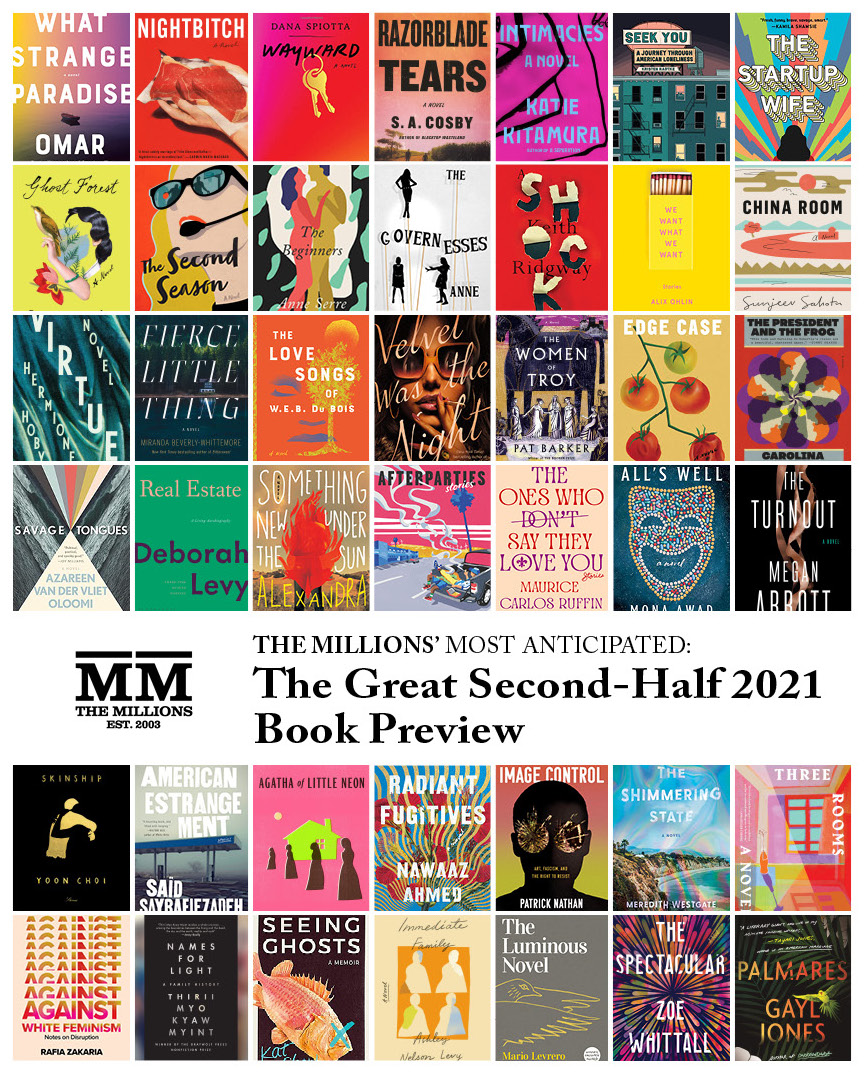We’ve just an entered an amazing six-month stretch for book-lovers. The second of half of 2021 brings the first novel from the legendary Gayl Jones in more than 20 years, and the first novel from Nobel laureate Wole Soyinka in nearly 50. How often do we get new work from Louise Erdrich, Colson Whitehead, Richard Powers, Ruth Ozeki, Jonathan Franzen, Margaret Verble, Percival Everett, Joy Williams, Sandra Cisneros, John Edgar Wideman, A.S. Byatt, Rabih Alameddine, Donald Antrim, and Maggie Nelson—all in one six-month period? Never! It doesn’t happen! We’ve got hotly anticipated books from Honorée Fanonne Jeffers, Sally Rooney, Venita Blackburn, Omar El Akkad, Tiphanie Yanique, and Claire Vaye Watkins. We’ve got novels and memoirs and stories. There are just so many exciting books headed our way.
We miss books every single time we do this, and as usual, we will continue with our monthly previews, beginning in August. Let us know in the comments what you’re looking out for, and look forward to 2022, when more delights awake, on the page, if nowhere else.
Want to help The Millions keep churning out great books coverage? Then sign up to be a member today.
July
 What Strange Paradise by Omar El Akkad: In his acclaimed bestselling debut, American War, El Akkad demonstrated his ability to capture complex political events and place them on a personal scale. With his new novel, What Strange Paradise, he has done it again, this time asking questions about the global refugee crisis. It opens with the sinking of a dilapidated ship and bodies washing up on the shores of a small island. A nine-year-old Syrian boy, Amir, survives the wreck and is rescued by a teenage girl. The novel tells the story of their bond. As the publisher says, it’s “beautifully written, unrelentingly dramatic, and profoundly moving.” (Claire)
What Strange Paradise by Omar El Akkad: In his acclaimed bestselling debut, American War, El Akkad demonstrated his ability to capture complex political events and place them on a personal scale. With his new novel, What Strange Paradise, he has done it again, this time asking questions about the global refugee crisis. It opens with the sinking of a dilapidated ship and bodies washing up on the shores of a small island. A nine-year-old Syrian boy, Amir, survives the wreck and is rescued by a teenage girl. The novel tells the story of their bond. As the publisher says, it’s “beautifully written, unrelentingly dramatic, and profoundly moving.” (Claire)
 Night Bitch by Rachel Yoder: The startling cover of this debut first caught my attention, then the premise itself: a stay-at-home mother has reason to believe that she’s turning into a dog. When her husband dismisses her worries, she turns to a book of magic and then a multi-level marketing scheme. Started during Jami Attenberg’s #1000WordsofSummer challenge, it’s been optioned for a film that will star Amy Adams and which Yoder herself will adapt. One way or the other, you’re going to be talking about this book. (Hannah)
Night Bitch by Rachel Yoder: The startling cover of this debut first caught my attention, then the premise itself: a stay-at-home mother has reason to believe that she’s turning into a dog. When her husband dismisses her worries, she turns to a book of magic and then a multi-level marketing scheme. Started during Jami Attenberg’s #1000WordsofSummer challenge, it’s been optioned for a film that will star Amy Adams and which Yoder herself will adapt. One way or the other, you’re going to be talking about this book. (Hannah)
 Wayward by Dana Spiotta: The author of Eat the Document and Stone Arabia now graces us with a deep-dive into women: Mothers as daughters, their daughters, their daughter’s grandmothers as mothers. Taylor Antrim called it both “affecting” and “Gloriously cool.” (Marie Myung-Ok Lee)
Wayward by Dana Spiotta: The author of Eat the Document and Stone Arabia now graces us with a deep-dive into women: Mothers as daughters, their daughters, their daughter’s grandmothers as mothers. Taylor Antrim called it both “affecting” and “Gloriously cool.” (Marie Myung-Ok Lee)
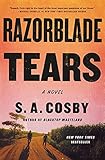 Razorblade Tears by S.A. Crosby: Crosby’s arrival last year with his pedal-to-the-metal rural noir debut Blacktop Wasteland was a sorely needed bright spot in an otherwise miserable pandemic year. In his sophomore novel, Ike Randolph, a Black ex-con, learns that his son has been murdered along with his white husband Derek, and joins forces with Derek’s father, another former criminal with ties to the underworld, to find the killers. (Michael)
Razorblade Tears by S.A. Crosby: Crosby’s arrival last year with his pedal-to-the-metal rural noir debut Blacktop Wasteland was a sorely needed bright spot in an otherwise miserable pandemic year. In his sophomore novel, Ike Randolph, a Black ex-con, learns that his son has been murdered along with his white husband Derek, and joins forces with Derek’s father, another former criminal with ties to the underworld, to find the killers. (Michael)
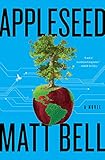 Appleseed by Matt Bell: In the past, two brothers planted apple seeds. In the near future, climate change and capitalism destroy orchards and much else. Still farther out, ice blankets us all. In Bell’s 600-page mythic thriller, readers move forward through each era. In the real world, we hope to slow the pace. (Nick M.)
Appleseed by Matt Bell: In the past, two brothers planted apple seeds. In the near future, climate change and capitalism destroy orchards and much else. Still farther out, ice blankets us all. In Bell’s 600-page mythic thriller, readers move forward through each era. In the real world, we hope to slow the pace. (Nick M.)
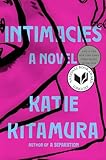 Intimacies by Katie Kitamura: The author of the haunting novel A Separation, returns with a novel of a woman who goes to work as an interpreter at the International Court in the Hague, a place where her work and life and those of her friends and acquaintances intersect in explosive ways. Dana Spiotta calls Intimacies “a haunting, precise, and morally astute novel that reads like a psychological thriller…Katie Kitamura is a wonder.” (Lydia)
Intimacies by Katie Kitamura: The author of the haunting novel A Separation, returns with a novel of a woman who goes to work as an interpreter at the International Court in the Hague, a place where her work and life and those of her friends and acquaintances intersect in explosive ways. Dana Spiotta calls Intimacies “a haunting, precise, and morally astute novel that reads like a psychological thriller…Katie Kitamura is a wonder.” (Lydia)
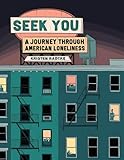 Seek You: A Journey through American Loneliness by Kristen Radtke: The graphic novel is the ideal format for a book on loneliness. Sometimes only a sole image can conjure the feeling of longing and vulnerability, and other times, you need both words and images to visualize sublime vulnerability. Radtke seamlessly guides readers through the history of loneliness, with striking drawings and thoughtful reflections on the lengths humans have gone to combat or avoid their lone selves. Never has a study on loneliness made me feel less alone. (Kate)
Seek You: A Journey through American Loneliness by Kristen Radtke: The graphic novel is the ideal format for a book on loneliness. Sometimes only a sole image can conjure the feeling of longing and vulnerability, and other times, you need both words and images to visualize sublime vulnerability. Radtke seamlessly guides readers through the history of loneliness, with striking drawings and thoughtful reflections on the lengths humans have gone to combat or avoid their lone selves. Never has a study on loneliness made me feel less alone. (Kate)
 The Startup Wife by Tahmima Anam: He was a boy, she was a girl; she’s a brilliant coder and he gets the credit. In Anam’s newest novel, Asha Ray is a generational coding talent who runs into—and quickly marries—her high school crush. Together they enter the rabid startup world with an idea: what if tech rituals replaced religion? But startup bro-culture doesn’t leave much room for Asha, and if tech innovators get to be gods, where does that leave everyone else? Anam’s own startup experiences underpin the book’s sharp and knowing satire, but at its core The Startup Wife is about much more than skewering our modern silicon messiahs. (Kaulie)
The Startup Wife by Tahmima Anam: He was a boy, she was a girl; she’s a brilliant coder and he gets the credit. In Anam’s newest novel, Asha Ray is a generational coding talent who runs into—and quickly marries—her high school crush. Together they enter the rabid startup world with an idea: what if tech rituals replaced religion? But startup bro-culture doesn’t leave much room for Asha, and if tech innovators get to be gods, where does that leave everyone else? Anam’s own startup experiences underpin the book’s sharp and knowing satire, but at its core The Startup Wife is about much more than skewering our modern silicon messiahs. (Kaulie)
 Ghost Forest by Pik-Shuen Fung: In this touching and delicate debut, Fung approaches the big political event—the handover of Hong Kong to China in 1997—at an intimate and personal level. Before the Handover, the family of the protagonist immigrate to Vancouver like many other Hong Kongers back then. However, her father immigrates only nominally. In real life, he remains in Hong Kong to make money. The novel starts with his unexpected death that leaves the young protagonist with many unresolved questions. This is a fascinating epic of a Chinese-Canadian family, heartbreaking, daring, and relieving. (Jianan Qian)
Ghost Forest by Pik-Shuen Fung: In this touching and delicate debut, Fung approaches the big political event—the handover of Hong Kong to China in 1997—at an intimate and personal level. Before the Handover, the family of the protagonist immigrate to Vancouver like many other Hong Kongers back then. However, her father immigrates only nominally. In real life, he remains in Hong Kong to make money. The novel starts with his unexpected death that leaves the young protagonist with many unresolved questions. This is a fascinating epic of a Chinese-Canadian family, heartbreaking, daring, and relieving. (Jianan Qian)
 The Second Season by Emily Adrian: Four years ago, in an essay published right here at The Millions, I asked why there hasn’t been a Great American Basketball Novel yet. Well, there is now: The Second Season, by Adrian. And no less an expert than Kareem Abdul-Jabbar agrees, calling it “A riveting, insightful, and touching story.” The Second Season tells the story of basketball announcer Ruth Devon—loosely based on Doris Burke, as most NBA fans will recognize—as she attempts to become the first female NBA announcer on national television, while, like so many women, juggling the competing demands of maternal and professional identities. Adrian writes with a knowledge and passion for the game, but fandom is not a prerequisite for falling in love with this brilliant, warm, and funny book. (Adam Price)
The Second Season by Emily Adrian: Four years ago, in an essay published right here at The Millions, I asked why there hasn’t been a Great American Basketball Novel yet. Well, there is now: The Second Season, by Adrian. And no less an expert than Kareem Abdul-Jabbar agrees, calling it “A riveting, insightful, and touching story.” The Second Season tells the story of basketball announcer Ruth Devon—loosely based on Doris Burke, as most NBA fans will recognize—as she attempts to become the first female NBA announcer on national television, while, like so many women, juggling the competing demands of maternal and professional identities. Adrian writes with a knowledge and passion for the game, but fandom is not a prerequisite for falling in love with this brilliant, warm, and funny book. (Adam Price)
 The Beginners by Anne Serre (translated by Mark Hutchinson): French author Serre has stated that the writer’s only responsibility is to seduce: “You have to build a trap, a wonderful trap, that the reader is only too happy to fall into.” It’s a seduction she’s performed in the tight, fabulist tales of her two previous books translated into English—The Fool and The Governesses. And now, in her third, The Beginners, she tells a tale of a literal seduction, where Anna, an art critic, who 20 years into a stable romantic partnership experiences a coup de foudre that she must give herself over to. (Anne)
The Beginners by Anne Serre (translated by Mark Hutchinson): French author Serre has stated that the writer’s only responsibility is to seduce: “You have to build a trap, a wonderful trap, that the reader is only too happy to fall into.” It’s a seduction she’s performed in the tight, fabulist tales of her two previous books translated into English—The Fool and The Governesses. And now, in her third, The Beginners, she tells a tale of a literal seduction, where Anna, an art critic, who 20 years into a stable romantic partnership experiences a coup de foudre that she must give herself over to. (Anne)
 A Shock by Keith Ridgway: It’s been almost a decade since Irish writer Ridgway produced his cult crime novel Hawthorn & Child. He has finally given his fans A Shock, a string of loosely linked stories set in neighboring London houses occupied by druggy characters who appear, disappear, then reappear. They shout at rats. They hide inside walls and in attics. They realize that the sound of a washing machine actually improves a Charles Mingus recording. Here’s how Ridgway writes: “His skin was a leathery peel. A wet dry thing. He had been scraped and reapplied to himself and now he was dying in the street like an ant on a fire.” Hell, yes. (Bill)
A Shock by Keith Ridgway: It’s been almost a decade since Irish writer Ridgway produced his cult crime novel Hawthorn & Child. He has finally given his fans A Shock, a string of loosely linked stories set in neighboring London houses occupied by druggy characters who appear, disappear, then reappear. They shout at rats. They hide inside walls and in attics. They realize that the sound of a washing machine actually improves a Charles Mingus recording. Here’s how Ridgway writes: “His skin was a leathery peel. A wet dry thing. He had been scraped and reapplied to himself and now he was dying in the street like an ant on a fire.” Hell, yes. (Bill)
 We Want What We Want by Alix Ohlin: Heidi Julavits, author of The Folded Clock, puts it well when she says Ohlin’s work is, “spoken of in the same reverent breath as Lorrie Moore and Joy Williams.” This is a new collection from the award-winning author of Dual Citizens. The stories are about people who test boundaries, like Vanessa, who comes home from a year away volunteering to find a childhood friend in her father’s bed, or Amanda, who drives upstate to rescue a cousin from a cult only to find an alluring situation. Each story is, “diamond-sharp,” says the publisher, “sparkling with pain, humor, and beauty.” (Claire)
We Want What We Want by Alix Ohlin: Heidi Julavits, author of The Folded Clock, puts it well when she says Ohlin’s work is, “spoken of in the same reverent breath as Lorrie Moore and Joy Williams.” This is a new collection from the award-winning author of Dual Citizens. The stories are about people who test boundaries, like Vanessa, who comes home from a year away volunteering to find a childhood friend in her father’s bed, or Amanda, who drives upstate to rescue a cousin from a cult only to find an alluring situation. Each story is, “diamond-sharp,” says the publisher, “sparkling with pain, humor, and beauty.” (Claire)
 China Room by Sunjeev Sahota: Sahota was one of the Granta Best Young British Novelists of the Decade in 2013 and his The Year of the Runaways was shortlisted for the Man Booker and the Dylan Thomas Prize. His new novel, partially inspired by his family’s history, jumps between 1929 and 1999 but begins with a new bride, Mehar, in Punjab in 1929, as she tries to learn about her husband and becomes wrapped up in secrets that will reverberate through the decades. Kamila Shamsie calls the novel “A gorgeous, gripping read.” (Lydia)
China Room by Sunjeev Sahota: Sahota was one of the Granta Best Young British Novelists of the Decade in 2013 and his The Year of the Runaways was shortlisted for the Man Booker and the Dylan Thomas Prize. His new novel, partially inspired by his family’s history, jumps between 1929 and 1999 but begins with a new bride, Mehar, in Punjab in 1929, as she tries to learn about her husband and becomes wrapped up in secrets that will reverberate through the decades. Kamila Shamsie calls the novel “A gorgeous, gripping read.” (Lydia)
 Virtue by Hermione Hoby: Hoby’s new novel, after Neon in Daylight, follows a young man named Luca as he goes to New York for an internship at a magazine and is pulled both into the dreamy summer orbit of a wealthy white couple, and into a conversation about race, injustice, and privilege that has profoundly different consequences for Luca than it does for his fellow intern, a Black woman named Zara. Jia Tolentino says of Hoby, “with bewitching precision, she captures the ominous beauty and soft underbelly of our protest summers. The result is both a sumptuous portrait of all-consuming attraction and a compassionate indictment of shallow social conscience. I loved this novel, and sank deep into its radiance and rot.” (Lydia)
Virtue by Hermione Hoby: Hoby’s new novel, after Neon in Daylight, follows a young man named Luca as he goes to New York for an internship at a magazine and is pulled both into the dreamy summer orbit of a wealthy white couple, and into a conversation about race, injustice, and privilege that has profoundly different consequences for Luca than it does for his fellow intern, a Black woman named Zara. Jia Tolentino says of Hoby, “with bewitching precision, she captures the ominous beauty and soft underbelly of our protest summers. The result is both a sumptuous portrait of all-consuming attraction and a compassionate indictment of shallow social conscience. I loved this novel, and sank deep into its radiance and rot.” (Lydia)
 Fierce Little Thing by Miranda Beverly-Whittemore: In her latest novel, bestselling author Beverly-Whittemore has written a Secret History-esque tale of suspense about a group of childhood friends and the secret that haunts their adulthood. The book’s got all the ingredients for the perfect summer read: short breathless chapters; a sinister cult in the wilds of Maine; and beautiful, sharp prose. In its starred review, Kirkus calls it: “A compelling study of power, sociopathy, and the possibilities of survival.” (Edan)
Fierce Little Thing by Miranda Beverly-Whittemore: In her latest novel, bestselling author Beverly-Whittemore has written a Secret History-esque tale of suspense about a group of childhood friends and the secret that haunts their adulthood. The book’s got all the ingredients for the perfect summer read: short breathless chapters; a sinister cult in the wilds of Maine; and beautiful, sharp prose. In its starred review, Kirkus calls it: “A compelling study of power, sociopathy, and the possibilities of survival.” (Edan)
 Give My Love to the Savages by Chris Stuck: A debut collection of short stories linked by the experience of Black men from different walks of life, in places across the United States, as they find themselves on the receiving end of a racist slur. Victor LaValle says of the collection “You’re going to laugh, you’re going to gasp, you’re going to wonder if you’re allowed to enjoy this book and then you’re going to be laughing all over again. This is Black satire with bite, like Zora Neale Hurston used to do, with a smile and a sharp elbow. A touch of Paul Beatty, a dose of Dolemite, and a serving of Dorothy Parker, too. Give My Love to the Savage sannounces Chris Stuck as a fearless talent, a debut that’ll make your sides and your heart hurt.” (Lydia)
Give My Love to the Savages by Chris Stuck: A debut collection of short stories linked by the experience of Black men from different walks of life, in places across the United States, as they find themselves on the receiving end of a racist slur. Victor LaValle says of the collection “You’re going to laugh, you’re going to gasp, you’re going to wonder if you’re allowed to enjoy this book and then you’re going to be laughing all over again. This is Black satire with bite, like Zora Neale Hurston used to do, with a smile and a sharp elbow. A touch of Paul Beatty, a dose of Dolemite, and a serving of Dorothy Parker, too. Give My Love to the Savage sannounces Chris Stuck as a fearless talent, a debut that’ll make your sides and your heart hurt.” (Lydia)
 Embassy Wife by Katie Crouch: This novel portrays and skewers the modern ex-pat life in this tableau of Fulbrighters and Diplomats—not all of them are what they claim to be—in Namibia. Natalie Baszile says of the novel, “Keenly observed and expertly crafted, Katie Crouch’s Embassy Wife is a wickedly irresistible novel.” (Lydia)
Embassy Wife by Katie Crouch: This novel portrays and skewers the modern ex-pat life in this tableau of Fulbrighters and Diplomats—not all of them are what they claim to be—in Namibia. Natalie Baszile says of the novel, “Keenly observed and expertly crafted, Katie Crouch’s Embassy Wife is a wickedly irresistible novel.” (Lydia)
 A Passage North by Anuk Arudpragasam: Arudpragasam’s second novel, after the critically acclaimed The Story of a Brief Marriage, follows a man named Krishan as he travels from Colombo to the northern part of Sri Lanka when he learns of the sudden death of his grandmother’s caretaker. The journey becomes, among other things, a meditation on the 30-year civil war. The Financial Times raved, “It can take just two novels to establish a writer as one of the most individual minds of their generation. With his new novel, a revelatory exploration of the aftermath of war, Arudpragasam cements his reputation. It calls to mind the work of W.G. Sebald. . . . [An] extraordinary and often illuminating novel.” (Lydia)
A Passage North by Anuk Arudpragasam: Arudpragasam’s second novel, after the critically acclaimed The Story of a Brief Marriage, follows a man named Krishan as he travels from Colombo to the northern part of Sri Lanka when he learns of the sudden death of his grandmother’s caretaker. The journey becomes, among other things, a meditation on the 30-year civil war. The Financial Times raved, “It can take just two novels to establish a writer as one of the most individual minds of their generation. With his new novel, a revelatory exploration of the aftermath of war, Arudpragasam cements his reputation. It calls to mind the work of W.G. Sebald. . . . [An] extraordinary and often illuminating novel.” (Lydia)
 A Touch of Jen by Beth Morgan: A work of satirical, psychedelic horror that follows two service workers obsessed with an influencer type as they travel to the Hamptons and insinuate themselves into her world with unexpected results. Kristen Arnett raved “Morgan has created a fabulous monster here, legitimately Frankensteined herself a wicked, unflinching, dynamite novel out of razor-sharp dialogue, toxic social media culture, and the nonsense notion that the self is just another brand to be endlessly plumbed for content. Wildly hilarious and absolutely terrifying, A Touch of Jen is truly a touch of genius. I loved every minute of it.” (Lydia)
A Touch of Jen by Beth Morgan: A work of satirical, psychedelic horror that follows two service workers obsessed with an influencer type as they travel to the Hamptons and insinuate themselves into her world with unexpected results. Kristen Arnett raved “Morgan has created a fabulous monster here, legitimately Frankensteined herself a wicked, unflinching, dynamite novel out of razor-sharp dialogue, toxic social media culture, and the nonsense notion that the self is just another brand to be endlessly plumbed for content. Wildly hilarious and absolutely terrifying, A Touch of Jen is truly a touch of genius. I loved every minute of it.” (Lydia)
August
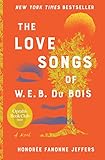 The Love Songs of W.E.B. Du Bois by Honorée Fanonne Jeffers: In her ambitious fiction debut, the 2020 National Book Award-nominated poet meditates on African-American history from the colonial slave trade to our current, turbulent age. Ailey Pearl Garfield, the protagonist of the novel, grows up navigating W.E.B. Du Bois’s “Double Consciousness” in everyday life in the deep South. Her mother’s side of family was taken to the U.S. as enslaved people. The female members of her family, in particular, went through many shocking experiences. Coming of age, Ailey learns to fully embrace her heritage by exploring and understanding the traumatic memories of her family. (Jianan)
The Love Songs of W.E.B. Du Bois by Honorée Fanonne Jeffers: In her ambitious fiction debut, the 2020 National Book Award-nominated poet meditates on African-American history from the colonial slave trade to our current, turbulent age. Ailey Pearl Garfield, the protagonist of the novel, grows up navigating W.E.B. Du Bois’s “Double Consciousness” in everyday life in the deep South. Her mother’s side of family was taken to the U.S. as enslaved people. The female members of her family, in particular, went through many shocking experiences. Coming of age, Ailey learns to fully embrace her heritage by exploring and understanding the traumatic memories of her family. (Jianan)
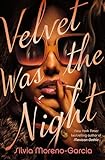 Velvet Was the Night by Silvia Moreno-Garcia: Moreno-Garcia follows up her bestselling Mexican Gothic with a noirish thriller set amid the political upheaval in 1970s Mexico City. A mousy secretary named Maite is envious of the racy life of her neighbor Leonora, a beautiful art student who goes missing. Determined to solve the mystery, Maite is soon joined in her quest by a hired thug named Elvis, who is also on Leonara’s trail. Linked by their shared love for old movies, comics and rock ’n’ roll, the unlikely duo is sucked into a world of students, radicals, Russian spies, hit men, and government agents who will kill to protect Leonora’s dark secrets. (Bill)
Velvet Was the Night by Silvia Moreno-Garcia: Moreno-Garcia follows up her bestselling Mexican Gothic with a noirish thriller set amid the political upheaval in 1970s Mexico City. A mousy secretary named Maite is envious of the racy life of her neighbor Leonora, a beautiful art student who goes missing. Determined to solve the mystery, Maite is soon joined in her quest by a hired thug named Elvis, who is also on Leonara’s trail. Linked by their shared love for old movies, comics and rock ’n’ roll, the unlikely duo is sucked into a world of students, radicals, Russian spies, hit men, and government agents who will kill to protect Leonora’s dark secrets. (Bill)
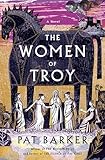 The Women of Troy by Pat Barker: Booker Prize-winning Barker got her start writing about the English working-class women she grew up with. Eventually she branched out and wrote The Silence of the Girls, a retelling of The Iliad from the eyes of an enslaved girl. She has followed that with The Women of Troy, in which the conquered titular women, led by Briseis, plot their revenge against their Greek captors, whose triumphal trip home with their spoils is delayed by uncooperative winds. Once again, Barker uses blunt prose to tell human stories that strip the romance from one of literature’s enduring epics. (Bill)
The Women of Troy by Pat Barker: Booker Prize-winning Barker got her start writing about the English working-class women she grew up with. Eventually she branched out and wrote The Silence of the Girls, a retelling of The Iliad from the eyes of an enslaved girl. She has followed that with The Women of Troy, in which the conquered titular women, led by Briseis, plot their revenge against their Greek captors, whose triumphal trip home with their spoils is delayed by uncooperative winds. Once again, Barker uses blunt prose to tell human stories that strip the romance from one of literature’s enduring epics. (Bill)
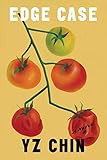 Edge Case by YZ Chin: In a follow-up to her award-winning story collection, Though I Get Home, Chin’s debut novel follows Edwina, a Malaysian immigrant living in New York City, after she is abandoned by her husband. As she searches for him, Edwina thinks back on their relationship—and navigates her feelings of isolation, uncertainty, and (perhaps misplaced) loyalty. About the book, Chia-Chia Lin writes: “A quirky story of loss and limbo, Edge Case immerses us in the worries, hopes, and absurdities of life on a work visa in America.” (Carolyn)
Edge Case by YZ Chin: In a follow-up to her award-winning story collection, Though I Get Home, Chin’s debut novel follows Edwina, a Malaysian immigrant living in New York City, after she is abandoned by her husband. As she searches for him, Edwina thinks back on their relationship—and navigates her feelings of isolation, uncertainty, and (perhaps misplaced) loyalty. About the book, Chia-Chia Lin writes: “A quirky story of loss and limbo, Edge Case immerses us in the worries, hopes, and absurdities of life on a work visa in America.” (Carolyn)
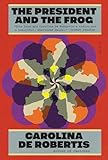 The President and the Frog by Carolina De Robertis: Inspired by the life of Uruguay’s former president José Mujica, De Robertis’ latest novel follows the 82-year-old protagonist (the “Poorest President in the World”) as he’s interviewed by a journalist. Switching between the present and memories of the past, the president—a former guerrilla, revolutionary, and political prisoner—remembers the most monumental moments of his life. About this survival story, Madeline Miller writes: “Playful and profound, unearthly yet deeply rooted, this sublime and gripping novel is above all about hope: that within the world’s messy pain there is still room for transformation and healing.” (Carolyn)
The President and the Frog by Carolina De Robertis: Inspired by the life of Uruguay’s former president José Mujica, De Robertis’ latest novel follows the 82-year-old protagonist (the “Poorest President in the World”) as he’s interviewed by a journalist. Switching between the present and memories of the past, the president—a former guerrilla, revolutionary, and political prisoner—remembers the most monumental moments of his life. About this survival story, Madeline Miller writes: “Playful and profound, unearthly yet deeply rooted, this sublime and gripping novel is above all about hope: that within the world’s messy pain there is still room for transformation and healing.” (Carolyn)
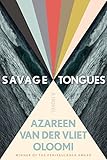 Savage Tongues by Azareen Van der Vliet Oloomi: Written with the intensity of early Duras and Ferrante’s Days of Abandonment, Savage Tongues, Van der Vliet Oloomi’s third novel, is “relentless in the best way.” Iranian-American Arezu returns to her father’s Spanish pied-a-terre that she has just inherited, conjuring the memory of an intense and catastrophic affair she had 20 years previous. With the help of a dear friend, Arezu excavates and puts words to her past trauma in this novel about love, friendship, identity, and displacement. As Garth Greenwell attests, Savage Tongues “lives at the border of memory and dream, restlessly seeking a logic that can transform cruelty into love.” (Anne)
Savage Tongues by Azareen Van der Vliet Oloomi: Written with the intensity of early Duras and Ferrante’s Days of Abandonment, Savage Tongues, Van der Vliet Oloomi’s third novel, is “relentless in the best way.” Iranian-American Arezu returns to her father’s Spanish pied-a-terre that she has just inherited, conjuring the memory of an intense and catastrophic affair she had 20 years previous. With the help of a dear friend, Arezu excavates and puts words to her past trauma in this novel about love, friendship, identity, and displacement. As Garth Greenwell attests, Savage Tongues “lives at the border of memory and dream, restlessly seeking a logic that can transform cruelty into love.” (Anne)
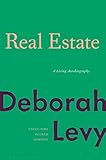 Real Estate by Deborah Levy: Real Estate, the third and final book of Deborah Levy’s ‘living autobiography,” takes on the idea of home and houses in many iterations: the haunted, the literary, and what homespace means to a woman writer. Levy considers much about unreal estate too, as the narrator collects her fantasy dream homes. “Domestic space,” Levy observes, “if it is not an affliction bestowed on us by patriarchy, can be a powerful space.” And in essence, puts forth what has always been at the heart of this project, “to embody and make present a female mind.” (Anne)
Real Estate by Deborah Levy: Real Estate, the third and final book of Deborah Levy’s ‘living autobiography,” takes on the idea of home and houses in many iterations: the haunted, the literary, and what homespace means to a woman writer. Levy considers much about unreal estate too, as the narrator collects her fantasy dream homes. “Domestic space,” Levy observes, “if it is not an affliction bestowed on us by patriarchy, can be a powerful space.” And in essence, puts forth what has always been at the heart of this project, “to embody and make present a female mind.” (Anne)
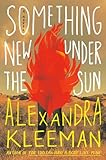 Something New Under the Sun by Alexandra Kleeman. Following You Too Can Have a Body Like Mine and a story collection, Intimations, Kleeman returns to the novel form with East Coaster Patrick coming to Hollywood to oversee the film adaptation of one of his books. He ends up, with the help of a former child star, on a mission to find out the secrets of WAT-R, a synthetic water in this satirical and imaginative novel about climate change, consumerism, fake news, informational overload, and a Hamlet problem. (Marie)
Something New Under the Sun by Alexandra Kleeman. Following You Too Can Have a Body Like Mine and a story collection, Intimations, Kleeman returns to the novel form with East Coaster Patrick coming to Hollywood to oversee the film adaptation of one of his books. He ends up, with the help of a former child star, on a mission to find out the secrets of WAT-R, a synthetic water in this satirical and imaginative novel about climate change, consumerism, fake news, informational overload, and a Hamlet problem. (Marie)
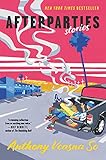 Afterparties by Anthony Veasna So. This is the debut collection of Cambodian American So, who tragically died suddenly in 2020 (his Year in Reading was published posthumously at The Millions). The collection slipstreams between humor and pathos—as suggested in the title “Three Women of Chuck’s Donuts,” a story that appeared in The New Yorker—as the characters carry the residue of the Khmer Rouge genocide through immigration, race, sexuality, friendship, and family. “Like beams of wry, affectionate light, falling from different directions on a complicated, struggling, beloved American community,” says George Saunders. (Marie)
Afterparties by Anthony Veasna So. This is the debut collection of Cambodian American So, who tragically died suddenly in 2020 (his Year in Reading was published posthumously at The Millions). The collection slipstreams between humor and pathos—as suggested in the title “Three Women of Chuck’s Donuts,” a story that appeared in The New Yorker—as the characters carry the residue of the Khmer Rouge genocide through immigration, race, sexuality, friendship, and family. “Like beams of wry, affectionate light, falling from different directions on a complicated, struggling, beloved American community,” says George Saunders. (Marie)
 Paris Is a Party, Paris Is a Ghost by David Hoon Kim: Henrik Blatand is alienated from his identity as a Japanese man, as he is the adoptive son of Danish parents. After his girlfriend, Fumiko, dies by suicide, this darkly comic novel follows Henrik following Fumiko’s body to its dissection by a medical student. Publishers Weekly called this debut “splendid.” (Marie)
Paris Is a Party, Paris Is a Ghost by David Hoon Kim: Henrik Blatand is alienated from his identity as a Japanese man, as he is the adoptive son of Danish parents. After his girlfriend, Fumiko, dies by suicide, this darkly comic novel follows Henrik following Fumiko’s body to its dissection by a medical student. Publishers Weekly called this debut “splendid.” (Marie)
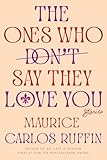 The Ones Who Don’t Say They Love You by Maurice Carlos Ruffin: Ruffin’s first novel, We Cast a Shadow, was a powerful dystopian satire that featured a Black lawyer’s obsessional quest to obtain a “demelanization” procedure for his biracial son. In an interview, Ruffin described how his legal training (he worked in corporate law and then for the Social Security Administration), afforded him a unique view of society, an “X-ray that allows us to see behind walls, the studs and pillars that make up the structure of a house.” Here, Ruffin turns his penetrating gaze on his hometown, the Big Easy, in a collection Publishers Weekly calls “a rich tour of hardscrabble New Orleans.” (Matt)
The Ones Who Don’t Say They Love You by Maurice Carlos Ruffin: Ruffin’s first novel, We Cast a Shadow, was a powerful dystopian satire that featured a Black lawyer’s obsessional quest to obtain a “demelanization” procedure for his biracial son. In an interview, Ruffin described how his legal training (he worked in corporate law and then for the Social Security Administration), afforded him a unique view of society, an “X-ray that allows us to see behind walls, the studs and pillars that make up the structure of a house.” Here, Ruffin turns his penetrating gaze on his hometown, the Big Easy, in a collection Publishers Weekly calls “a rich tour of hardscrabble New Orleans.” (Matt)
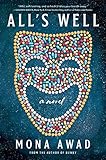 All’s Well by Mona Awad: “Dear Readers: This is one wild book!,” said Margaret Atwood on Twitter, “No holds barred.” It’s the story of Miranda Fitch, who had an accident that ended her acting career and left her with chronic back pain. She’s on the verge of losing her teaching job at a college, and facing a mutinous cast, when three strange benefactors show up. They know about her past and make alluring promises for the future—what could go wrong? If you had the pleasure of reading Awad’s acclaimed novel Bunny, you know the answer is everything and the result will be, as Heather O’Neill says, “equal parts brilliant and hilarious.” (Claire)
All’s Well by Mona Awad: “Dear Readers: This is one wild book!,” said Margaret Atwood on Twitter, “No holds barred.” It’s the story of Miranda Fitch, who had an accident that ended her acting career and left her with chronic back pain. She’s on the verge of losing her teaching job at a college, and facing a mutinous cast, when three strange benefactors show up. They know about her past and make alluring promises for the future—what could go wrong? If you had the pleasure of reading Awad’s acclaimed novel Bunny, you know the answer is everything and the result will be, as Heather O’Neill says, “equal parts brilliant and hilarious.” (Claire)
 Several People are Typing by Calvin Kasulke: Rife with office humor, Internet speak, and sharp criticisms of capitalism, Kasulke’s extremely online debut novel is composed entirely of Slack messages. Employed by a New York-based PR firm, mid-level employee Gerald works from home—as his consciousness trolls the company’s Slack channels. As work emergencies emerge and romances blossom, Gerald begins to question his work-life situation and attempts to find his body. Kasulke’s satirical novel has garnered praise from the likes of Carmen Maria Machado (“an absurd, hilarious romp”); Hilary Leichter (“a Greek chorus of modern strife”); and Daniel Lavery (“a winsome, light-footed book with deceptive staying power”). (Carolyn)
Several People are Typing by Calvin Kasulke: Rife with office humor, Internet speak, and sharp criticisms of capitalism, Kasulke’s extremely online debut novel is composed entirely of Slack messages. Employed by a New York-based PR firm, mid-level employee Gerald works from home—as his consciousness trolls the company’s Slack channels. As work emergencies emerge and romances blossom, Gerald begins to question his work-life situation and attempts to find his body. Kasulke’s satirical novel has garnered praise from the likes of Carmen Maria Machado (“an absurd, hilarious romp”); Hilary Leichter (“a Greek chorus of modern strife”); and Daniel Lavery (“a winsome, light-footed book with deceptive staying power”). (Carolyn)
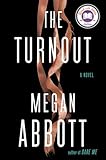 The Turnout by Megan Abbott: “Ballet flows through their veins,” says the description of this book, and Abbott’s many fans will know how unnerving these five words will turn out to be. This is the 10th novel from the bestselling author who looks at femininity and power like no one else. It’s about a ballet studio run by two sisters with long necks, taut buns, and pink tights. When a suspicious accident happens just before the annual performance of The Nutcracker, an interloper arrives and threatens to upset everything. (Claire)
The Turnout by Megan Abbott: “Ballet flows through their veins,” says the description of this book, and Abbott’s many fans will know how unnerving these five words will turn out to be. This is the 10th novel from the bestselling author who looks at femininity and power like no one else. It’s about a ballet studio run by two sisters with long necks, taut buns, and pink tights. When a suspicious accident happens just before the annual performance of The Nutcracker, an interloper arrives and threatens to upset everything. (Claire)
 Skinship by Yoon Choi: A constellation of Korean American families populates this debut collection, praised by Chang-rae Lee as “immediately dazzling and impressive, and yet the closer and deeper you look, the more you appreciate the sheer countless brilliance.” Roxane Gay says, “These stories of Korean American families are delicately plotted, subtle and immensely pleasurable to read.” (Marie)
Skinship by Yoon Choi: A constellation of Korean American families populates this debut collection, praised by Chang-rae Lee as “immediately dazzling and impressive, and yet the closer and deeper you look, the more you appreciate the sheer countless brilliance.” Roxane Gay says, “These stories of Korean American families are delicately plotted, subtle and immensely pleasurable to read.” (Marie)
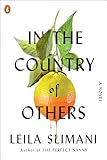 In the Country of Others by Leïla Slimani: Slimani is both a novelist and a diplomat in the government of Emanuel Macron, and those seemingly divergent vocations have more in common than might be first assumed. Both require a genius for empathy, an ability to translate experiences, and and understanding of what’s important to leave in and what’s crucial to leave out. Her latest book In the Country of Others, first in a planned trilogy, recounts the lives of French Mathilde, married to a Moroccan solider stationed in France during the Second World War. Having returned to his home country, Mathilde negotiates the difficulty of literally being “in the country of others” at a moment of post-colonial awakening in North Africa. Asking what it means to exist between cultures, and how we negotiate the ever-shifting complexities of privilege and identity, the book acknowledges that such questions are as far from abstract as imaginable, and as intimate as the marriage bed, for “How can you be two things at once? Are you obliged to choose one side over the other?” (Ed)
In the Country of Others by Leïla Slimani: Slimani is both a novelist and a diplomat in the government of Emanuel Macron, and those seemingly divergent vocations have more in common than might be first assumed. Both require a genius for empathy, an ability to translate experiences, and and understanding of what’s important to leave in and what’s crucial to leave out. Her latest book In the Country of Others, first in a planned trilogy, recounts the lives of French Mathilde, married to a Moroccan solider stationed in France during the Second World War. Having returned to his home country, Mathilde negotiates the difficulty of literally being “in the country of others” at a moment of post-colonial awakening in North Africa. Asking what it means to exist between cultures, and how we negotiate the ever-shifting complexities of privilege and identity, the book acknowledges that such questions are as far from abstract as imaginable, and as intimate as the marriage bed, for “How can you be two things at once? Are you obliged to choose one side over the other?” (Ed)
 American Estrangement by Saïd Sayrafiezadeh: Essayist, playwright, and short story writer Sayrafiezadeh won accolades for his visceral memoir When Skateboards Will Be Free, about his experience growing up in Pittsburgh the son of an Iranian father and a Jewish mother who were committed members of the Socialist Workers Party. The consummate outsider, Sayrafiezadeh examines our nation’s sins with a particularly clear eye, and his latest collection of short stories, American Estrangement, is no exception. Gathering stories from The New Yorker and The Paris Review, Sayrafiezadeh provides a portrait of a country racked by unemployment, drug addiction, and a sense of despair, earning him comparisons to George Saunders and Denis Johnson. In an interview with The New Yorker, Sayrafiezadeh explained that “One of the questions I wanted to pose…was how can we ‘know’ ourselves if we’re not equipped with the necessary vocabulary?” American Estrangement supplies some of that vocabulary. (Ed)
American Estrangement by Saïd Sayrafiezadeh: Essayist, playwright, and short story writer Sayrafiezadeh won accolades for his visceral memoir When Skateboards Will Be Free, about his experience growing up in Pittsburgh the son of an Iranian father and a Jewish mother who were committed members of the Socialist Workers Party. The consummate outsider, Sayrafiezadeh examines our nation’s sins with a particularly clear eye, and his latest collection of short stories, American Estrangement, is no exception. Gathering stories from The New Yorker and The Paris Review, Sayrafiezadeh provides a portrait of a country racked by unemployment, drug addiction, and a sense of despair, earning him comparisons to George Saunders and Denis Johnson. In an interview with The New Yorker, Sayrafiezadeh explained that “One of the questions I wanted to pose…was how can we ‘know’ ourselves if we’re not equipped with the necessary vocabulary?” American Estrangement supplies some of that vocabulary. (Ed)
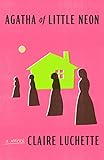 Agatha of Little Neon by Claire Luchette: The eponymous Agatha of Luchette’s debut novel has been a nun for nine years when her parish closes and she and her three sisters must move to a former mill town to take over a halfway house. In Woonsocket, Agatha becomes a teacher at an all-girls’ school and must face the world without her fellow nuns and the comfort of their closed world. Cristina Henríquez says the book is “blazingly original, wry, and perfectly attuned to the oddness—and the profundity—of life” and Karen Thompson Walker highlights Luchette’s “sneaky deadpan wit.” (Edan)
Agatha of Little Neon by Claire Luchette: The eponymous Agatha of Luchette’s debut novel has been a nun for nine years when her parish closes and she and her three sisters must move to a former mill town to take over a halfway house. In Woonsocket, Agatha becomes a teacher at an all-girls’ school and must face the world without her fellow nuns and the comfort of their closed world. Cristina Henríquez says the book is “blazingly original, wry, and perfectly attuned to the oddness—and the profundity—of life” and Karen Thompson Walker highlights Luchette’s “sneaky deadpan wit.” (Edan)
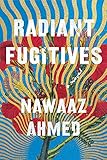 Radiant Fugitives by Nawaaz Ahmed: Ahmed’s debut novel, about three generations of women from a Muslim Indian family, is told from the point of view of heroine Seema’s baby—at the moment of its birth. Publishers Weekly, in its starred review, calls it “dazzling, heartrending,” and Peter Ho Davies named it “a rare marvel, an intimate epic of faith and family, love and politics, knit together by a magical omniscience of profound compassion.” If that’s not enough for you, rumor has it that the ending is brilliant, and reframes the entire book. (Edan)
Radiant Fugitives by Nawaaz Ahmed: Ahmed’s debut novel, about three generations of women from a Muslim Indian family, is told from the point of view of heroine Seema’s baby—at the moment of its birth. Publishers Weekly, in its starred review, calls it “dazzling, heartrending,” and Peter Ho Davies named it “a rare marvel, an intimate epic of faith and family, love and politics, knit together by a magical omniscience of profound compassion.” If that’s not enough for you, rumor has it that the ending is brilliant, and reframes the entire book. (Edan)
 Image Control by Patrick Nathan: Novelist Nathan (Some Hell) makes his nonfiction debut with this investigation of how fascism spreads through images, in particular the rapid-fire memes and photographs that come to us via social media, fragmenting our attention and numbing our response. With its mix of personal anecdote and political critique, the book has been compared in early reviews to Susan Sontag’s nonfiction, but to me it sounds like a cousin to George Trow’s prescient Within the Context of No Context, about the alienating effects of television and mass media. (Hannah)
Image Control by Patrick Nathan: Novelist Nathan (Some Hell) makes his nonfiction debut with this investigation of how fascism spreads through images, in particular the rapid-fire memes and photographs that come to us via social media, fragmenting our attention and numbing our response. With its mix of personal anecdote and political critique, the book has been compared in early reviews to Susan Sontag’s nonfiction, but to me it sounds like a cousin to George Trow’s prescient Within the Context of No Context, about the alienating effects of television and mass media. (Hannah)
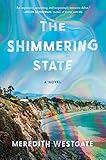 The Shimmering State by Meredith Westgate: There’s a new drug on the streets of LA: Mem, in the form of shimmering pills, contains happy memories selected to treat Alzheimer’s patients. It’s also a hit on the black market and among the elite, offering users short glimpses of someone else’s life. Though Lucien and Sophie came to the drug in different ways, it leads them both to a rehab facility run by Mem’s producers—though they’re sure they’ve run into each other before. Our own Lydia Kiesling calls The Shimmering State “hypnotic,” “a shimmering, dreamlike experience of multiple lives that collide and repel,” and, ultimately, a “beautifully dystopian shot at redemption.” (Kaulie)
The Shimmering State by Meredith Westgate: There’s a new drug on the streets of LA: Mem, in the form of shimmering pills, contains happy memories selected to treat Alzheimer’s patients. It’s also a hit on the black market and among the elite, offering users short glimpses of someone else’s life. Though Lucien and Sophie came to the drug in different ways, it leads them both to a rehab facility run by Mem’s producers—though they’re sure they’ve run into each other before. Our own Lydia Kiesling calls The Shimmering State “hypnotic,” “a shimmering, dreamlike experience of multiple lives that collide and repel,” and, ultimately, a “beautifully dystopian shot at redemption.” (Kaulie)
 Silent Winds, Dry Seas by Vinod Busjeet: Mauritius-born Busjeet spent 29 years working in economic development, finance, and diplomacy before publishing his debut novel, Silent Winds, Dry Seas, which, coincidentally, traces the spilling, connected stories of a family as told by Vishnu Bhushan following his return to the island after decades away. A coming-of-age story, a time-spanning narrative web, a compelling introduction to Mauritius and the breakthrough novel of a confident and original writer, Silent Winds “dazzles” (Publishers Weekly) as it surveys the emotional depths just off the Mauritian shore. (Kaulie)
Silent Winds, Dry Seas by Vinod Busjeet: Mauritius-born Busjeet spent 29 years working in economic development, finance, and diplomacy before publishing his debut novel, Silent Winds, Dry Seas, which, coincidentally, traces the spilling, connected stories of a family as told by Vishnu Bhushan following his return to the island after decades away. A coming-of-age story, a time-spanning narrative web, a compelling introduction to Mauritius and the breakthrough novel of a confident and original writer, Silent Winds “dazzles” (Publishers Weekly) as it surveys the emotional depths just off the Mauritian shore. (Kaulie)
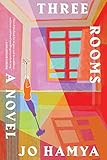 Three Rooms by Jo Hamya: Virginia Woolf said we women writers need rooms of our own; Hamya’s unnamed narrator can only manage a succession of domestic way-places, a small collection of rented rooms and childhood bedrooms. It’s 2018 and the mood in Britain is dark, smothered by both increasingly obvious inequality and instability and the realization that nobody knows what to do about it. Meanwhile, the narrator of Three Rooms shuffles from research job to temp gig, spending a lot of time online and searching for her place in the world, wondering when it all became so hard. If this sounds dark, it may be, but there’s no denying it strikes a chord, amplified by the beautifully spare prose—think Rachel Cusk, fresh from grad school. (Kaulie)
Three Rooms by Jo Hamya: Virginia Woolf said we women writers need rooms of our own; Hamya’s unnamed narrator can only manage a succession of domestic way-places, a small collection of rented rooms and childhood bedrooms. It’s 2018 and the mood in Britain is dark, smothered by both increasingly obvious inequality and instability and the realization that nobody knows what to do about it. Meanwhile, the narrator of Three Rooms shuffles from research job to temp gig, spending a lot of time online and searching for her place in the world, wondering when it all became so hard. If this sounds dark, it may be, but there’s no denying it strikes a chord, amplified by the beautifully spare prose—think Rachel Cusk, fresh from grad school. (Kaulie)
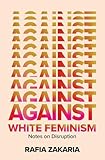 Against White Feminism by Rafia Zakaria: Journalist Zakaria has written a rebuttal to the feminism promulgated by white upper-middle-class women, including the “aid-industrial complex,” in a book that focuses on women of color and rejects “white feminism’s global, long-standing affinity with colonial, patriarchal, and white supremacist ideals.” (Lydia)
Against White Feminism by Rafia Zakaria: Journalist Zakaria has written a rebuttal to the feminism promulgated by white upper-middle-class women, including the “aid-industrial complex,” in a book that focuses on women of color and rejects “white feminism’s global, long-standing affinity with colonial, patriarchal, and white supremacist ideals.” (Lydia)
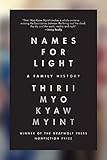 Names for Light by Thirii Myo Kyaw Myint: Winner of the Graywolf Nonfiction Prize, Myint’s lyrical memoir shifts from her family’s roots and her birth in Myanmar to her childhood in Bangkok and San Jose, moving through her own life and the lives of her family members, narrating events in both the near and distant past. In a starred review, Kirkus calls the book “An imaginative and compelling memoir about what we inherit and what we pass on.” (Lydia)
Names for Light by Thirii Myo Kyaw Myint: Winner of the Graywolf Nonfiction Prize, Myint’s lyrical memoir shifts from her family’s roots and her birth in Myanmar to her childhood in Bangkok and San Jose, moving through her own life and the lives of her family members, narrating events in both the near and distant past. In a starred review, Kirkus calls the book “An imaginative and compelling memoir about what we inherit and what we pass on.” (Lydia)
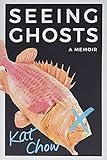 Seeing Ghosts: A Memoir by Kat Chow: Founding member of NPR’s Code Switch, Chow is unusually fixated and worried over her parents dying, so much so that her mother made a joke about it. Then her mother dies unexpectedly, devastating the family. Ocean Vuong calls this memoir “a courageous act of excavation and salvage.” (Marie)
Seeing Ghosts: A Memoir by Kat Chow: Founding member of NPR’s Code Switch, Chow is unusually fixated and worried over her parents dying, so much so that her mother made a joke about it. Then her mother dies unexpectedly, devastating the family. Ocean Vuong calls this memoir “a courageous act of excavation and salvage.” (Marie)
 Immediate Family by Ashley Nelson Levy: Levy’s debut novel is a short, powerful exploration of family written as an address from a woman to her brother, a boy from Thailand who was adopted by a white family from suburban California when he was three years old. Rachel Khong wrote of the novel, “This unsparing and absorbing family portrait broke my heart and remade it a hundred times over. In prose that is distilled, astute, and precise, Immediate Family covers the territory of life that words are often insufficient for, those challenges that are at once isolating and universal—waiting, the imperfect love that binds a family, what you choose and what is chosen for you.” (Lydia)
Immediate Family by Ashley Nelson Levy: Levy’s debut novel is a short, powerful exploration of family written as an address from a woman to her brother, a boy from Thailand who was adopted by a white family from suburban California when he was three years old. Rachel Khong wrote of the novel, “This unsparing and absorbing family portrait broke my heart and remade it a hundred times over. In prose that is distilled, astute, and precise, Immediate Family covers the territory of life that words are often insufficient for, those challenges that are at once isolating and universal—waiting, the imperfect love that binds a family, what you choose and what is chosen for you.” (Lydia)
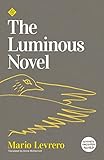 The Luminous Novel by Mario Levrero (translated by Annie McDermott): This is the latest posthumously translated novel from the Uruguayan Levrero, whose Montevideo apartment was, to quote his translator McDermott, “the centre of a small universe…his legendary literary workshops, which followed an ‘unmethodical method’ designed to put people in touch with their imagination, produced hundreds of students who consider themselves his disciples.” Here, a novelist receives a generous grant that produces an insuperable writer’s block. As with Empty Words, in which the protagonist attempts “graphological self-therapy” (handwriting exercises) to better himself, this is a digressive, Sternean tale in which interruption becomes a kind of illumination. (Matt)
The Luminous Novel by Mario Levrero (translated by Annie McDermott): This is the latest posthumously translated novel from the Uruguayan Levrero, whose Montevideo apartment was, to quote his translator McDermott, “the centre of a small universe…his legendary literary workshops, which followed an ‘unmethodical method’ designed to put people in touch with their imagination, produced hundreds of students who consider themselves his disciples.” Here, a novelist receives a generous grant that produces an insuperable writer’s block. As with Empty Words, in which the protagonist attempts “graphological self-therapy” (handwriting exercises) to better himself, this is a digressive, Sternean tale in which interruption becomes a kind of illumination. (Matt)
 Leave Society by Tao Lin: In Lin’s newest novel, novelist Li travels back and forth between New York City and Taipei. As the years pass, Li worries over his parents’ health, takes psychedelics, writes autofiction, and contemplates the universe. “Leave Society is a warm, funny, hearteningly nonconformist book that changed the way I think about natural health, wellbeing, and the great mystery,” says Melissa Broder. (Carolyn)
Leave Society by Tao Lin: In Lin’s newest novel, novelist Li travels back and forth between New York City and Taipei. As the years pass, Li worries over his parents’ health, takes psychedelics, writes autofiction, and contemplates the universe. “Leave Society is a warm, funny, hearteningly nonconformist book that changed the way I think about natural health, wellbeing, and the great mystery,” says Melissa Broder. (Carolyn)
September
 Palmares by Gayl Jones: A signal event in publishing, this is the first of five of Jones’s new novels to be published after 20 years without a new book from the brilliant author of Corregidora, among other novels. (Read more about Jones’s career in this piece by Calvin Baker.) Palmares is a sprawling story set in 17th-century Brazil, and follows an enslaved woman named Almeyda who escapes to a fugitive slave settlement and embarks on a journey to find her lost husband. Imani Perri says that Jones’s work “represents a watershed in American literature. From a literary standpoint, her form is impeccable; from a historical standpoint, she stands at the very cutting edge of understanding the modern world, and as a Black woman writer, her truth-telling, filled with beauty, tragedy, humor, and incisiveness, is unmatched. Jones is a writer’s writer, and her influence is found everywhere.” (Lydia)
Palmares by Gayl Jones: A signal event in publishing, this is the first of five of Jones’s new novels to be published after 20 years without a new book from the brilliant author of Corregidora, among other novels. (Read more about Jones’s career in this piece by Calvin Baker.) Palmares is a sprawling story set in 17th-century Brazil, and follows an enslaved woman named Almeyda who escapes to a fugitive slave settlement and embarks on a journey to find her lost husband. Imani Perri says that Jones’s work “represents a watershed in American literature. From a literary standpoint, her form is impeccable; from a historical standpoint, she stands at the very cutting edge of understanding the modern world, and as a Black woman writer, her truth-telling, filled with beauty, tragedy, humor, and incisiveness, is unmatched. Jones is a writer’s writer, and her influence is found everywhere.” (Lydia)
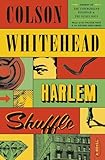 Harlem Shuffle by Colson Whitehead: Anyone who’s read the author’s The Colossus of New York knows no one writes more expansively and lovingly about New York City than Whitehead. Reminiscent of the work of Chester Himes, Harlem Shuffle starts with a heist and plays out in a beautifully recreated New York City of the early 1960s. A family saga, a genre-bending a social novel about race and power, and ultimately a love letter to New York, particularly Harlem. (Marie)
Harlem Shuffle by Colson Whitehead: Anyone who’s read the author’s The Colossus of New York knows no one writes more expansively and lovingly about New York City than Whitehead. Reminiscent of the work of Chester Himes, Harlem Shuffle starts with a heist and plays out in a beautifully recreated New York City of the early 1960s. A family saga, a genre-bending a social novel about race and power, and ultimately a love letter to New York, particularly Harlem. (Marie)
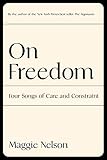 On Freedom: Four Songs of Care and Constraint by Maggie Nelson: Nelson returns to her signature blend of theory, scholarship, criticism, and personal revelation with a meditation on the thorny word “freedom,” and what it means in the world we live in today. In a starred review, Publishers Weekly writes, “Once again, Nelson proves herself a masterful thinker and an unparalleled prose stylist.” (Lydia)
On Freedom: Four Songs of Care and Constraint by Maggie Nelson: Nelson returns to her signature blend of theory, scholarship, criticism, and personal revelation with a meditation on the thorny word “freedom,” and what it means in the world we live in today. In a starred review, Publishers Weekly writes, “Once again, Nelson proves herself a masterful thinker and an unparalleled prose stylist.” (Lydia)
 The Spectacular by Zoe Whittall: Whittall’s third novel, The Best Kind of People, was shortlisted for the Scotiabank Giller Prize. She’s also a screenwriter with credits like The Baroness Von Sketch Show and Schitt’s Creek. This novel tells the story of a 22-year-old woman named Missy who is in a famous band; her mother, Carola, who is recovering from a sex scandal at a yoga center; and grandmother Ruth, who is 83 when Missy winds up crashing at her house. The three stories weave around questions about motherhood: what if you regretted it? Kristen Arnett says, “Whittall addresses motherhood and autonomy in ways I’ve never seen done before.” (Claire)
The Spectacular by Zoe Whittall: Whittall’s third novel, The Best Kind of People, was shortlisted for the Scotiabank Giller Prize. She’s also a screenwriter with credits like The Baroness Von Sketch Show and Schitt’s Creek. This novel tells the story of a 22-year-old woman named Missy who is in a famous band; her mother, Carola, who is recovering from a sex scandal at a yoga center; and grandmother Ruth, who is 83 when Missy winds up crashing at her house. The three stories weave around questions about motherhood: what if you regretted it? Kristen Arnett says, “Whittall addresses motherhood and autonomy in ways I’ve never seen done before.” (Claire)
 Bewilderment by Richard Powers: Powers follows The Overstory with a family story, which is also an earth story, about an astrobiologist struggling to raise his angry nine-year-old in the wake of his mother’s death, including using an experimental treatment that involves using the recorded patterns of her brain. In a starred review, Kirkus calls the novel a “taut ecological parable…A touching novel that offers a vital message with uncommon sympathy and intelligence.” (Lydia)
Bewilderment by Richard Powers: Powers follows The Overstory with a family story, which is also an earth story, about an astrobiologist struggling to raise his angry nine-year-old in the wake of his mother’s death, including using an experimental treatment that involves using the recorded patterns of her brain. In a starred review, Kirkus calls the novel a “taut ecological parable…A touching novel that offers a vital message with uncommon sympathy and intelligence.” (Lydia)
 Matrix by Lauren Groff: Groff’s highly anticipated first new novel since Fates and Furies tackles the desire, creativity, and vision of women following “Marie of France” (based on based on 12th-century poet Marie de France) in an arc that covers actual historic event from the Crusades to the papal interdict of 1208. (Marie)
Matrix by Lauren Groff: Groff’s highly anticipated first new novel since Fates and Furies tackles the desire, creativity, and vision of women following “Marie of France” (based on based on 12th-century poet Marie de France) in an arc that covers actual historic event from the Crusades to the papal interdict of 1208. (Marie)
 The Book of Form and Emptiness by Ruth Ozeki: The marvelous Ozeki—novelist, filmmaker, and Buddhist priest—publishes her first novel since A Tale for the Time Being. The new book is the story of Benny Oh, who hears voices—the voices of things that surround him, voices that become more and more insistent as his life becomes more and more chaotic. With her characteristic charm, empathy, and perspicacity, Ozeki writes Benny’s story of learning to hear, and manage, the voices, and hear himself along the way. David Mitchell says “This compassionate novel of life, love and loss glows in the dark. Its strange, beautiful pages turn themselves. If you’ve lost your way with fiction over the last year or two, let The Book of Form and Emptiness light your way home.” (Lydia)
The Book of Form and Emptiness by Ruth Ozeki: The marvelous Ozeki—novelist, filmmaker, and Buddhist priest—publishes her first novel since A Tale for the Time Being. The new book is the story of Benny Oh, who hears voices—the voices of things that surround him, voices that become more and more insistent as his life becomes more and more chaotic. With her characteristic charm, empathy, and perspicacity, Ozeki writes Benny’s story of learning to hear, and manage, the voices, and hear himself along the way. David Mitchell says “This compassionate novel of life, love and loss glows in the dark. Its strange, beautiful pages turn themselves. If you’ve lost your way with fiction over the last year or two, let The Book of Form and Emptiness light your way home.” (Lydia)
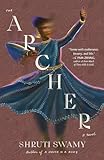 The Archer by Shruti Swamy: Following her collection of short stories, A House Is a Body, which Kiese Laymon called “one of the greatest short story collections of the 2020s,” Swamy returns with a novel set in the Bombay of the 1960s and 1970s, following a young woman named Vidya as she pursues the art form of Kathak, an exacting dance, and confronts the dilemmas that pit art against the demands of wifehood in her time and place. C Pam Zhang called the novel “lush and sensual, tasted and felt, with striking images that play out like film behind the eyes. Swamy evokes an India that resists flat stereotype and teems with exuberance, beauty, and life. The Archer is timeless yet utterly modern as it asks what it means for a woman to make a life of art.” (Lydia)
The Archer by Shruti Swamy: Following her collection of short stories, A House Is a Body, which Kiese Laymon called “one of the greatest short story collections of the 2020s,” Swamy returns with a novel set in the Bombay of the 1960s and 1970s, following a young woman named Vidya as she pursues the art form of Kathak, an exacting dance, and confronts the dilemmas that pit art against the demands of wifehood in her time and place. C Pam Zhang called the novel “lush and sensual, tasted and felt, with striking images that play out like film behind the eyes. Swamy evokes an India that resists flat stereotype and teems with exuberance, beauty, and life. The Archer is timeless yet utterly modern as it asks what it means for a woman to make a life of art.” (Lydia)
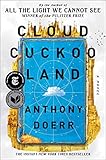 Cloud Cuckoo Land by Anthony Doerr: In 2014, Doerr’s breakout World War II novel All the Light We Cannot See managed to package abstruse physics and a sympathetic young Nazi into a thinking person’s literary thriller that dominated the bestseller lists for months. Seven years later, Doerr is back with another history-driven tale of a long-lost Greek manuscript, which turns up in the library of a spaceship seeking a habitable planet in the 22nd century. Other chapters take place during the 1453 siege of Constantinople and in present-day Idaho. “This is a marvel,” says an early review in Publishers Weekly. (Michael)
Cloud Cuckoo Land by Anthony Doerr: In 2014, Doerr’s breakout World War II novel All the Light We Cannot See managed to package abstruse physics and a sympathetic young Nazi into a thinking person’s literary thriller that dominated the bestseller lists for months. Seven years later, Doerr is back with another history-driven tale of a long-lost Greek manuscript, which turns up in the library of a spaceship seeking a habitable planet in the 22nd century. Other chapters take place during the 1453 siege of Constantinople and in present-day Idaho. “This is a marvel,” says an early review in Publishers Weekly. (Michael)
 How to Wrestle a Girl by Venita Blackburn: The second collection by the author of Black Jesus and Other Superheroes is a series of fiercely observant stories, many of which follow a teenage girl in the aftermath of her father’s death. Set in Southern California, these stories follow her as she grapples with her emerging queer identity, along with the challenges of her life at school and her kinetic and complicated family. In other stories, we see a class of teenagers torment their teacher to the point of mental collapse, as well as another story in which a different group of teens devise a scheme to sell their excess fat and skin. (Thom)
How to Wrestle a Girl by Venita Blackburn: The second collection by the author of Black Jesus and Other Superheroes is a series of fiercely observant stories, many of which follow a teenage girl in the aftermath of her father’s death. Set in Southern California, these stories follow her as she grapples with her emerging queer identity, along with the challenges of her life at school and her kinetic and complicated family. In other stories, we see a class of teenagers torment their teacher to the point of mental collapse, as well as another story in which a different group of teens devise a scheme to sell their excess fat and skin. (Thom)
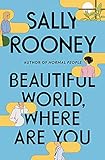 Beautiful World, Where Are You by Sally Rooney: The most widely read, discussed, and argued-about literary novelist of the last five years, Sally Rooney, returns in September with Beautiful World, Where Are You. The contours will sound familiar to anyone versed in Rooneyana: a quartet of friends—Alice, Felix, Eileen, and Simon—travel, have sex, worry about having sex, worry about themselves and their friendships and aging into adulthood in a very uncertain world. But while Rooney’s plot contrivances may occasionally, at least in summary, seem pat and prefab, her keen and tersely delivered observations about the follies of youth, sex, and friendships never are. (Adam Price)
Beautiful World, Where Are You by Sally Rooney: The most widely read, discussed, and argued-about literary novelist of the last five years, Sally Rooney, returns in September with Beautiful World, Where Are You. The contours will sound familiar to anyone versed in Rooneyana: a quartet of friends—Alice, Felix, Eileen, and Simon—travel, have sex, worry about having sex, worry about themselves and their friendships and aging into adulthood in a very uncertain world. But while Rooney’s plot contrivances may occasionally, at least in summary, seem pat and prefab, her keen and tersely delivered observations about the follies of youth, sex, and friendships never are. (Adam Price)
 Chronicles from the Happiest People on Earth by Wole Soyinka: The first new novel in 50 years from the Nobel laureate in literature. Chronicles, the third novel from Soyinka, best known for his award-winning plays and poetry (and life of essential political activism), is part whodunit, part social indictment, and as powerful as anything that came before. A Nigerian doctor realizes someone is selling body parts from his hospital for use in ritualistic practices, and with the help of an old friend, he begins to search for the thief—but neither realizes how far the search will take them. Toni Morrison once praised Soyinka, saying “You don’t see things the same when you encounter a voice like that,” and here that voice still has all of its power, wit, beauty, and purpose. (Kaulie)
Chronicles from the Happiest People on Earth by Wole Soyinka: The first new novel in 50 years from the Nobel laureate in literature. Chronicles, the third novel from Soyinka, best known for his award-winning plays and poetry (and life of essential political activism), is part whodunit, part social indictment, and as powerful as anything that came before. A Nigerian doctor realizes someone is selling body parts from his hospital for use in ritualistic practices, and with the help of an old friend, he begins to search for the thief—but neither realizes how far the search will take them. Toni Morrison once praised Soyinka, saying “You don’t see things the same when you encounter a voice like that,” and here that voice still has all of its power, wit, beauty, and purpose. (Kaulie)
 The Inheritance of Orquídea Divina by Zoraida Córdova: Fantasy, magical realism, family: When Orquídea Divina, the matriarch of an extended family, tells them to come home and collect their inheritance, they hope for answers about the strange magic and deep secrets Orquídea holds—and instead see her transformed, leaving only more questions behind. Years later, the family—some of whom now have magic of their own—are on the run from a man hunting them down and must trace Orquídea’s roots back to her native Ecuador, where everything started. Publishers Weekly calls Córdova’s first adult novel “radiant,” “thrillerlike,” and “inspired.” (Kaulie)
The Inheritance of Orquídea Divina by Zoraida Córdova: Fantasy, magical realism, family: When Orquídea Divina, the matriarch of an extended family, tells them to come home and collect their inheritance, they hope for answers about the strange magic and deep secrets Orquídea holds—and instead see her transformed, leaving only more questions behind. Years later, the family—some of whom now have magic of their own—are on the run from a man hunting them down and must trace Orquídea’s roots back to her native Ecuador, where everything started. Publishers Weekly calls Córdova’s first adult novel “radiant,” “thrillerlike,” and “inspired.” (Kaulie)
 The War for Gloria by Atticus Lish: In this follow-up to the smash debut Preparation for the Next Life, a 15-year-old boy becomes his mother’s caretaker when she’s diagnosed with ALS. Then his estranged father comes back into their lives. In Lish’s story of mothers and sons, perhaps the father must be destroyed in order for the boy to become a man. (Nick M.)
The War for Gloria by Atticus Lish: In this follow-up to the smash debut Preparation for the Next Life, a 15-year-old boy becomes his mother’s caretaker when she’s diagnosed with ALS. Then his estranged father comes back into their lives. In Lish’s story of mothers and sons, perhaps the father must be destroyed in order for the boy to become a man. (Nick M.)
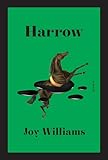 Harrow by Joy Williams: This novel, Williams’s first in two decades, follows the unlikely (and aged) rebels who sabotage corporations for their complicity in environmental destruction. Who better than Williams to capture pure-hearted but absurd efforts to retrieve paradise lost? (Nick M.)
Harrow by Joy Williams: This novel, Williams’s first in two decades, follows the unlikely (and aged) rebels who sabotage corporations for their complicity in environmental destruction. Who better than Williams to capture pure-hearted but absurd efforts to retrieve paradise lost? (Nick M.)
 The Trees by Percival Everett: Local law enforcement won’t help a pair of detectives solve a string of murders, which is to be expected. Those detectives finding a second body—a man who resembles Emmett Till—at each crime scene? Not so much. When similar murders occur across the country, what follows is a provocative page-turner focused on racialized police violence. (Nick M.)
The Trees by Percival Everett: Local law enforcement won’t help a pair of detectives solve a string of murders, which is to be expected. Those detectives finding a second body—a man who resembles Emmett Till—at each crime scene? Not so much. When similar murders occur across the country, what follows is a provocative page-turner focused on racialized police violence. (Nick M.)
Misfits by Michaela Coel: I May Destroy You was some of the most powerful television I have seen in recent years, an incredible exploration of trauma, violence, work, friendship, social media, and art (complete with a storyline about writers’ block). Subtitled A Personal Manifesto, Misfits is a book from Coel, who is both the brilliant mind behind the show and its star, built off the MacTaggart Lecture she delivered at the Edinburgh International Television Festival. Coel weaves stories of her own life with a call to honesty and action for everyone who has struggled to fit in. (Lydia)
 Martita, I Remember You by Sandra Cisneros (translated by Liliana Valenzuela): The legendary Cisneros returns with a novel published as a dual English-Spanish edition, a story of a woman who leaves her Mexican American family in Chicago and spends wild young days in Paris, forming a friendship with two other women that resurfaces years later with the chance discovery of an old letter. (Lydia)
Martita, I Remember You by Sandra Cisneros (translated by Liliana Valenzuela): The legendary Cisneros returns with a novel published as a dual English-Spanish edition, a story of a woman who leaves her Mexican American family in Chicago and spends wild young days in Paris, forming a friendship with two other women that resurfaces years later with the chance discovery of an old letter. (Lydia)
 The Wrong End of the Telescope by Rabih Alameddine: National Book Award finalist Alameddine’s sixth novel tells the story of Mina Simpson, a Lebanese doctor and trans woman who travels to the Greek island of Lesbos to provide aid at an infamous refugee camp. For decades, Mina has avoided traveling so close to her homeland, but she decided to visit the camp to accomplish something meaningful. But when she meets Sumaiya, a Syrian woman with terminal liver cancer, and tries to chart a course of treatment with the limited resources on the island, she’s forced to reckon with the scale of the migrants’ suffering, along with as her own limitations. (Thom)
The Wrong End of the Telescope by Rabih Alameddine: National Book Award finalist Alameddine’s sixth novel tells the story of Mina Simpson, a Lebanese doctor and trans woman who travels to the Greek island of Lesbos to provide aid at an infamous refugee camp. For decades, Mina has avoided traveling so close to her homeland, but she decided to visit the camp to accomplish something meaningful. But when she meets Sumaiya, a Syrian woman with terminal liver cancer, and tries to chart a course of treatment with the limited resources on the island, she’s forced to reckon with the scale of the migrants’ suffering, along with as her own limitations. (Thom)
 A Calling for Charlie Barnes by Joshua Ferris: Acclaimed novelist and short story writer Ferris returns in 2021 with A Calling for Charlie Barnes. Charlie Barnes, a multiply divorced romantic and schemer whose hopes for delivery are dashed by the financial crisis and a medical disaster, gets one more chance for redemption in the form of his storytelling son. Ferris is one of the master chroniclers of our declining American empire and spirit—his special gift is delivering the bad news with both laughs and an enormous amount of empathy that, at his best, recalls the work of Emerson and Thoreau. In the words of Dana Spiotta, “Joshua Ferris is one of our best writers, and A Calling for Charlie Barnes is wonderful: fast and deep, urgent and brilliant. Ingeniously written, it had me up reading late into the night. A hilarious, intimate, and scathing takedown of so many American vanities.” (Adam Price)
A Calling for Charlie Barnes by Joshua Ferris: Acclaimed novelist and short story writer Ferris returns in 2021 with A Calling for Charlie Barnes. Charlie Barnes, a multiply divorced romantic and schemer whose hopes for delivery are dashed by the financial crisis and a medical disaster, gets one more chance for redemption in the form of his storytelling son. Ferris is one of the master chroniclers of our declining American empire and spirit—his special gift is delivering the bad news with both laughs and an enormous amount of empathy that, at his best, recalls the work of Emerson and Thoreau. In the words of Dana Spiotta, “Joshua Ferris is one of our best writers, and A Calling for Charlie Barnes is wonderful: fast and deep, urgent and brilliant. Ingeniously written, it had me up reading late into the night. A hilarious, intimate, and scathing takedown of so many American vanities.” (Adam Price)
 Civilizations by Laurent Binet (translated by Sam Taylor): Binet’s fictions explore and exploit cracks in history. His bestselling first novel, HHhH, fictionalized the assassination of a high-ranking Nazi official, and his more recent The Seventh Function of Language made a thriller out of literary critic Roland Barthes‘s death. In Binet’s latest, Civilizations, he spins a counterfactual history of civilization where the Vikings discovered the Americas, Christopher Columbus and his men were captured upon their arrival, and the last Incan emperor repurposes Columbus’s fleet to sail to Europe, divide and conquer (using Machiavelli‘s The Prince as his guide). (Anne)
Civilizations by Laurent Binet (translated by Sam Taylor): Binet’s fictions explore and exploit cracks in history. His bestselling first novel, HHhH, fictionalized the assassination of a high-ranking Nazi official, and his more recent The Seventh Function of Language made a thriller out of literary critic Roland Barthes‘s death. In Binet’s latest, Civilizations, he spins a counterfactual history of civilization where the Vikings discovered the Americas, Christopher Columbus and his men were captured upon their arrival, and the last Incan emperor repurposes Columbus’s fleet to sail to Europe, divide and conquer (using Machiavelli‘s The Prince as his guide). (Anne)
 The Water Statues by Fleur Jaeggy (translated by Gini Alhadeff): Even when considered alongside Jaeggy’s other singular and slim novels, The Water Statues is a peculiar book. Within, Jaeggy tells the story of family and isolation, and the inheritance of loneliness and emotional poverty that accompanies wealth (in line with Orson Welles’s Citizen Kane, though that’s where comparisons end). This “strange and shimmering nonlinear text” is voluptuous yet melancholic and austere. Which seems in line with Jaeggy’s profession that, “One should be in one’s own void. Void is silence. Solitude. An absence of relationships…The void is a plant that must continually be watered.” (Anne)
The Water Statues by Fleur Jaeggy (translated by Gini Alhadeff): Even when considered alongside Jaeggy’s other singular and slim novels, The Water Statues is a peculiar book. Within, Jaeggy tells the story of family and isolation, and the inheritance of loneliness and emotional poverty that accompanies wealth (in line with Orson Welles’s Citizen Kane, though that’s where comparisons end). This “strange and shimmering nonlinear text” is voluptuous yet melancholic and austere. Which seems in line with Jaeggy’s profession that, “One should be in one’s own void. Void is silence. Solitude. An absence of relationships…The void is a plant that must continually be watered.” (Anne)
 Out of the Ruins: The Apocalyptic Anthology edited by Preston Grassman: Now here’s an idea whose time has come: an anthology from top writers who share a fascination with what worlds look like—and how humans change—after they’ve gone through an apocalyptic crisis. Among the contributors are The Millions staff writer Emily St. John Mandel, the British fantasy writer China Mieville, Clive Barker, Samuel R. Delaney, Carmen Maria Machado, and many more. This mix of new and classic stories asks questions that need to be asked in moments like the one we’re living through now. What makes us human? And who will we be when we come out of the ruins? (Bill)
Out of the Ruins: The Apocalyptic Anthology edited by Preston Grassman: Now here’s an idea whose time has come: an anthology from top writers who share a fascination with what worlds look like—and how humans change—after they’ve gone through an apocalyptic crisis. Among the contributors are The Millions staff writer Emily St. John Mandel, the British fantasy writer China Mieville, Clive Barker, Samuel R. Delaney, Carmen Maria Machado, and many more. This mix of new and classic stories asks questions that need to be asked in moments like the one we’re living through now. What makes us human? And who will we be when we come out of the ruins? (Bill)
 Lean Fall Stand by Jon McGregor: The newest novel by McGregor—who has thrice been longlisted for the Booker Prize—takes place in the aftermath of an Antarctic expedition gone terribly wrong. When veteran technician Robert Wright suffers a life shattering accident, his life—and how he approaches and interacts with the world—is changed forever. A starred review from Publishers Weekly calls the novel “stunning” and a “gorgeous work [that] leaves an indelible mark.” (Carolyn)
Lean Fall Stand by Jon McGregor: The newest novel by McGregor—who has thrice been longlisted for the Booker Prize—takes place in the aftermath of an Antarctic expedition gone terribly wrong. When veteran technician Robert Wright suffers a life shattering accident, his life—and how he approaches and interacts with the world—is changed forever. A starred review from Publishers Weekly calls the novel “stunning” and a “gorgeous work [that] leaves an indelible mark.” (Carolyn)
 The Magician by Colm Tóibín: Scribner describes Tóibín’s most recent project as “a stunning marriage of research and imagination” in this, his exploration of the life and art of Thomas Mann. Tóibín’s refined gift is about as perfect a match as could be imagined for the construction of a nuanced portrait of a complicated man and artist living in a complex period of modern history. (Il’ja)
The Magician by Colm Tóibín: Scribner describes Tóibín’s most recent project as “a stunning marriage of research and imagination” in this, his exploration of the life and art of Thomas Mann. Tóibín’s refined gift is about as perfect a match as could be imagined for the construction of a nuanced portrait of a complicated man and artist living in a complex period of modern history. (Il’ja)
 The Blue Book of Nebo by Manon Steffan Ros: With the greater part of the planet devastated by a nuclear disaster, a mother and son struggle to survive in a remote Welsh village. Despite their desolate existence, the pair soon learn that in an emptied land there is still plenty of room for secrets and plenty of time for grace. (Il’ja)
The Blue Book of Nebo by Manon Steffan Ros: With the greater part of the planet devastated by a nuclear disaster, a mother and son struggle to survive in a remote Welsh village. Despite their desolate existence, the pair soon learn that in an emptied land there is still plenty of room for secrets and plenty of time for grace. (Il’ja)
 The Actual Star by Monica Byrne: Reincarnation, a Belizean cave, 2000 years of connected narrative: mix them together and you have The Actual Star, an indescribable “epic saga of three reincarnated souls” from the author of The Girl in the Road. As it interweaves three stories, separated by millennia, the novel follows twin Mayans who become royalty, a young American woman on a trip abroad, and a group of futuristic people trying to survive after massive climate change. Already drawing comparisons to Octavia Butler’s Earthseed series and David Mitchell’s Cloud Atlas, The Actual Star is for those who love complexities and questions that transcend single lives. (Kaulie)
The Actual Star by Monica Byrne: Reincarnation, a Belizean cave, 2000 years of connected narrative: mix them together and you have The Actual Star, an indescribable “epic saga of three reincarnated souls” from the author of The Girl in the Road. As it interweaves three stories, separated by millennia, the novel follows twin Mayans who become royalty, a young American woman on a trip abroad, and a group of futuristic people trying to survive after massive climate change. Already drawing comparisons to Octavia Butler’s Earthseed series and David Mitchell’s Cloud Atlas, The Actual Star is for those who love complexities and questions that transcend single lives. (Kaulie)
 Heart Radical by Anne Liu Kellor: Kellor’s memoir describes her travels through China as a young multiracial woman, relaying her years living in China, falling in love, speaking her mother tongue, working, traveling, and searching for what called her to a place that is both familiar and not. Cheryl Strayed said of the memoir, “I loved this book. It’s vulnerable, searching, insightful, riveting and beautifully written.” (Lydia)
Heart Radical by Anne Liu Kellor: Kellor’s memoir describes her travels through China as a young multiracial woman, relaying her years living in China, falling in love, speaking her mother tongue, working, traveling, and searching for what called her to a place that is both familiar and not. Cheryl Strayed said of the memoir, “I loved this book. It’s vulnerable, searching, insightful, riveting and beautifully written.” (Lydia)
 An Ideal Presence by Eduardo Berti (translated by Daniel Levin Becker): The Argentinian novelist Berti wrote this after a “medico-literary residency” at a palliative care facility, and the first offering from the new press Fern Books is a highly fictionalized account of the myriad stories of the workers who make this vital department of human life run. Carmen Maria Machado says of the book, “An Ideal Presence is about death, yes, but more than that, it’s a meditation on the complicated business of living. A funny, tender book.” (Lydia)
An Ideal Presence by Eduardo Berti (translated by Daniel Levin Becker): The Argentinian novelist Berti wrote this after a “medico-literary residency” at a palliative care facility, and the first offering from the new press Fern Books is a highly fictionalized account of the myriad stories of the workers who make this vital department of human life run. Carmen Maria Machado says of the book, “An Ideal Presence is about death, yes, but more than that, it’s a meditation on the complicated business of living. A funny, tender book.” (Lydia)
 Crazy Sorrow by Vince Passaro: Nearly 20 years after his debut novel, Violence, Nudity, Adult Content, Passaro returns with a novel about the tumults of a relationship that spans four decades in the ever-changing New York City. (Lydia)
Crazy Sorrow by Vince Passaro: Nearly 20 years after his debut novel, Violence, Nudity, Adult Content, Passaro returns with a novel about the tumults of a relationship that spans four decades in the ever-changing New York City. (Lydia)
 No Gods, No Monsters by Cadwell Turnbull: Author of The Lesson, which was shortlisted for the VCU Cabell First Novelist Award, Turnbull returns with the first in a fantasy saga, one that involves police brutality, werewolves, and other monstrous things. In a starred review, Publishers Weekly lauds, “The expert combination of immersive prose, strong characters, sharp social commentary, and well-woven speculative elements” that make “for an unforgettable experience.” (Lydia)
No Gods, No Monsters by Cadwell Turnbull: Author of The Lesson, which was shortlisted for the VCU Cabell First Novelist Award, Turnbull returns with the first in a fantasy saga, one that involves police brutality, werewolves, and other monstrous things. In a starred review, Publishers Weekly lauds, “The expert combination of immersive prose, strong characters, sharp social commentary, and well-woven speculative elements” that make “for an unforgettable experience.” (Lydia)
 Hao by Ye Chun: A collection of stories that take place in China and America within the Chinese Diaspora, spanning time and place and focusing on the lives and struggles of women as they wrestle with everything that attends migration, motherhood, and personhood. Lynn Steger Strong says of the collection, “Each of these stories is an individual world brought to life fully by the particularity of its language, by Ye’s extraordinarily far-reaching and deeply felt imagination, combined with her consistently stunning acuity and control.” (Lydia)
Hao by Ye Chun: A collection of stories that take place in China and America within the Chinese Diaspora, spanning time and place and focusing on the lives and struggles of women as they wrestle with everything that attends migration, motherhood, and personhood. Lynn Steger Strong says of the collection, “Each of these stories is an individual world brought to life fully by the particularity of its language, by Ye’s extraordinarily far-reaching and deeply felt imagination, combined with her consistently stunning acuity and control.” (Lydia)
 Kaya Days by Carl de Souza (translated by Jeffrey Zuckerman): Named for the days of protest and mourning that followed the death of Mauritian musician Joseph Réginald Topize, or Kaya, at the hands of police, the debut novel by de Souza follows a woman through Mauritius as she searches for her missing brother, delineating the many intersecting worlds of the island nation at a revolutionary moment. J.M.G. Le Clézio calls the novel “a searing, urgent, far-seeing dispatch that imprints the reality of Mauritius, at odds with its picture-postcard views, on the global consciousness. Carl de Souza is a formidable voice in Mauritian literature; his account is an indictment and a plea for understanding among its communities.” (Lydia)
Kaya Days by Carl de Souza (translated by Jeffrey Zuckerman): Named for the days of protest and mourning that followed the death of Mauritian musician Joseph Réginald Topize, or Kaya, at the hands of police, the debut novel by de Souza follows a woman through Mauritius as she searches for her missing brother, delineating the many intersecting worlds of the island nation at a revolutionary moment. J.M.G. Le Clézio calls the novel “a searing, urgent, far-seeing dispatch that imprints the reality of Mauritius, at odds with its picture-postcard views, on the global consciousness. Carl de Souza is a formidable voice in Mauritian literature; his account is an indictment and a plea for understanding among its communities.” (Lydia)
 Talk to Me by T.C. Boyle: What if we could actually talk to the animals? What would they have to say? These are the questions at the heart of Boyle’s tale of a latter-day Dr. Doolittle, an animal behaviorist named Guy Schermerhorn, who teaches a chimp to speak in sign language. This attracts a young female student to his lab, setting off an interspecies love triangle that, since this is T.C. Boyle we’re talking about, promises to be as unsettling as it is hilarious. (Michael)
Talk to Me by T.C. Boyle: What if we could actually talk to the animals? What would they have to say? These are the questions at the heart of Boyle’s tale of a latter-day Dr. Doolittle, an animal behaviorist named Guy Schermerhorn, who teaches a chimp to speak in sign language. This attracts a young female student to his lab, setting off an interspecies love triangle that, since this is T.C. Boyle we’re talking about, promises to be as unsettling as it is hilarious. (Michael)
 The Morning Store by Karl Ove Knausgaard (translated by Martin Aitken): The mega-popular Norwegian author’s latest novel centers on a cast of characters who witness a bizarre astronomical phenomenon. On a normal night in August, a group of tangentially related people in the Norwegian resort town of Sørlandet watch as a massive star suddenly appears in the night sky. No one—including the astronomers—knows just what the star is or why it appeared. The days wear on, unusual and baffling things begin to occur, and the characters grapple with these events and their impact on their lives. (Thom)
The Morning Store by Karl Ove Knausgaard (translated by Martin Aitken): The mega-popular Norwegian author’s latest novel centers on a cast of characters who witness a bizarre astronomical phenomenon. On a normal night in August, a group of tangentially related people in the Norwegian resort town of Sørlandet watch as a massive star suddenly appears in the night sky. No one—including the astronomers—knows just what the star is or why it appeared. The days wear on, unusual and baffling things begin to occur, and the characters grapple with these events and their impact on their lives. (Thom)
 Inter State by José Vadi: As award-winning writer Vadi examines California with anger and love in his first essay collection, he centers the ever-changing Golden State and includes wildfires, dive bars, the tech industry, farmwork, decay, and wealth. Nina Renata Aron describes Vadi as an “ethnographer-on-a-skateboard” and Publishers Weekly describes the book as “part love letter, part indictment.” Vadi’s writing style has received much advanced praise: Kirkus says that “at a line level, the book is outstanding, filled with long, breathless sentences, innovative syntax,” and Melissa Valentine recommends that “with smart prose and daring form, these are perfect essays for our complicated times.” (Zoë)
Inter State by José Vadi: As award-winning writer Vadi examines California with anger and love in his first essay collection, he centers the ever-changing Golden State and includes wildfires, dive bars, the tech industry, farmwork, decay, and wealth. Nina Renata Aron describes Vadi as an “ethnographer-on-a-skateboard” and Publishers Weekly describes the book as “part love letter, part indictment.” Vadi’s writing style has received much advanced praise: Kirkus says that “at a line level, the book is outstanding, filled with long, breathless sentences, innovative syntax,” and Melissa Valentine recommends that “with smart prose and daring form, these are perfect essays for our complicated times.” (Zoë)
 In the Shadow of the Yalı by Suat Derviş (translated by Maureen Freely): Dervis (1905-1972) is a well-known Turkish author, feminist, and socialist who was placed under house arrest for her political beliefs and later exiled from Turkey for a decade. Described by Selim İleri as “a novel that examines love from a Marxist perspective,” In the Shadow of the Yalı takes place when Turkey is transitioning from the Ottoman Empire to the new Republic. The story follows Celile, who finds herself in an unexpected and passionate love affair. Ilana Masad declares that Derviş’s English-language debut “is a rare gem—a romantic character study, a social novel, and a feminist critique on patriarchy and capitalism.” (Zoë)
In the Shadow of the Yalı by Suat Derviş (translated by Maureen Freely): Dervis (1905-1972) is a well-known Turkish author, feminist, and socialist who was placed under house arrest for her political beliefs and later exiled from Turkey for a decade. Described by Selim İleri as “a novel that examines love from a Marxist perspective,” In the Shadow of the Yalı takes place when Turkey is transitioning from the Ottoman Empire to the new Republic. The story follows Celile, who finds herself in an unexpected and passionate love affair. Ilana Masad declares that Derviş’s English-language debut “is a rare gem—a romantic character study, a social novel, and a feminist critique on patriarchy and capitalism.” (Zoë)
October
 Crossroads by Jonathan Franzen: Whether he’s insulting Oprah or posing self-importantly as “The Great American Novelist” on the cover of Time, Franzen has a singular talent for arousing public contempt. But the fact is he writes good books. Here, he returns to his literary roots in the story of a troubled family, the Hildebrandts, fractured by the cultural upheaval of the early 1970s. The novel is the first in a planned trilogy, with the Middlemarchian title “A Key to All Mythologies,” that will span three generations of the Hildebrandt clan. (Michael)
Crossroads by Jonathan Franzen: Whether he’s insulting Oprah or posing self-importantly as “The Great American Novelist” on the cover of Time, Franzen has a singular talent for arousing public contempt. But the fact is he writes good books. Here, he returns to his literary roots in the story of a troubled family, the Hildebrandts, fractured by the cultural upheaval of the early 1970s. The novel is the first in a planned trilogy, with the Middlemarchian title “A Key to All Mythologies,” that will span three generations of the Hildebrandt clan. (Michael)
 My Monticello by Jocelyn Nicole Johnson: In her debut collection, Johnson explores a world (and country) ever on the brink and the people who choose to survive no matter the cost. In the titular novella, set in the near future, a Black descendant of Thomas Jefferson and Sally Hemings is driven from her home by violent white supremacists. In another story, a single mother attempts to buy a home before the apocalypse happens. About the incandescent collection, Colson Whitehead writes: ““A badass debut by any measure—nimble, knowing, and electrifying.” (Carolyn)
My Monticello by Jocelyn Nicole Johnson: In her debut collection, Johnson explores a world (and country) ever on the brink and the people who choose to survive no matter the cost. In the titular novella, set in the near future, a Black descendant of Thomas Jefferson and Sally Hemings is driven from her home by violent white supremacists. In another story, a single mother attempts to buy a home before the apocalypse happens. About the incandescent collection, Colson Whitehead writes: ““A badass debut by any measure—nimble, knowing, and electrifying.” (Carolyn)
 I Love You but I’ve Chosen Darkness by Claire Vaye Watkins: Vaye Watkins, author of Gold Fame Citrus, and the beloved story collection Battleborn, now brings us her second novel, which, clearly, has the most badass title of all time. In it, a writer suffering from postpartum depression leaves her husband and baby to do a speaking engagement in Reno, only to end up deep in the Mojave Desert where she grew up. Jenny Offill writes, “There’s some kind of genius sorcery in this novel. It’s startlingly original, hilarious and harrowing by turns, finally transcendent.” A piece by Vaye Watkins, with the same memorable title, is available to read on Granta. (Edan)
I Love You but I’ve Chosen Darkness by Claire Vaye Watkins: Vaye Watkins, author of Gold Fame Citrus, and the beloved story collection Battleborn, now brings us her second novel, which, clearly, has the most badass title of all time. In it, a writer suffering from postpartum depression leaves her husband and baby to do a speaking engagement in Reno, only to end up deep in the Mojave Desert where she grew up. Jenny Offill writes, “There’s some kind of genius sorcery in this novel. It’s startlingly original, hilarious and harrowing by turns, finally transcendent.” A piece by Vaye Watkins, with the same memorable title, is available to read on Granta. (Edan)
 Reprieve by James Han Mattson: Four contestants competing for a cash prize enter the final cell of Quigley House, a full-contact haunted escape room—but only three exit. Mattson’s second novel follows the survivors as they come to terms with how they are partially responsible for the tragedy. Rumaan Alam says, “But the brilliance of James Han Mattson’s novel is in deploying the haunted house as a metaphor for our nation, where the true scare is a cultural reckoning with whiteness itself.” (Carolyn)
Reprieve by James Han Mattson: Four contestants competing for a cash prize enter the final cell of Quigley House, a full-contact haunted escape room—but only three exit. Mattson’s second novel follows the survivors as they come to terms with how they are partially responsible for the tragedy. Rumaan Alam says, “But the brilliance of James Han Mattson’s novel is in deploying the haunted house as a metaphor for our nation, where the true scare is a cultural reckoning with whiteness itself.” (Carolyn)
 Trust by Domenico Starnone (translated by Jhumpa Lahiri): Lovers Pietro and Teresa are trying to save their doomed relationship when they decide to do something impulsive: share the most shameful secret of their lives. When they break up, their lives diverge temporarily—until Teresa begins to reappear at the most inopportune times. Acclaimed Italian novelist and National Book Award finalist Starnone’s newest novel explores vulnerability, relationships, and the gulf between our public and private selves. (Carolyn)
Trust by Domenico Starnone (translated by Jhumpa Lahiri): Lovers Pietro and Teresa are trying to save their doomed relationship when they decide to do something impulsive: share the most shameful secret of their lives. When they break up, their lives diverge temporarily—until Teresa begins to reappear at the most inopportune times. Acclaimed Italian novelist and National Book Award finalist Starnone’s newest novel explores vulnerability, relationships, and the gulf between our public and private selves. (Carolyn)
 The House of Rust by Khadija Abdalla Bajaber: Winner of the inaugural Graywolf Press African Fiction Prize, Bajaber’s debut novel—a fabulist bildungsroman—follows a Hadrami girl who takes to the sea after her fisherman father goes missing. The magical novel has already garnered praise from Shailja Patel (“The House of Rust is as labyrinthine, magical and multilayered as Mombasa itself”) and Yvonne Adhiambo Owuor (“…Bajaber is a radiant addition to the constellations of transcultural literature”), among others. (Carolyn)
The House of Rust by Khadija Abdalla Bajaber: Winner of the inaugural Graywolf Press African Fiction Prize, Bajaber’s debut novel—a fabulist bildungsroman—follows a Hadrami girl who takes to the sea after her fisherman father goes missing. The magical novel has already garnered praise from Shailja Patel (“The House of Rust is as labyrinthine, magical and multilayered as Mombasa itself”) and Yvonne Adhiambo Owuor (“…Bajaber is a radiant addition to the constellations of transcultural literature”), among others. (Carolyn)
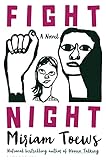 Fight Night by Miriam Toews: The award-winning author of Women Talking and All My Puny Sorrows is back with a novel as moving as it is full of humor. Swiv is a nine-year-old who lives in Toronto with her pregnant mother and lively grandmother. When Swiv is expelled from school, Grandma takes on the role of teacher. Swiv, in turn, assigns Grandma the job of writing her unborn brother, Gord. “You’re a small thing,” Grandma writes, “and you must learn to fight.” As Susan Cole, in Now Magazine, says, “Few authors mix humor and deep emotion with Toews’s skill.” (Claire)
Fight Night by Miriam Toews: The award-winning author of Women Talking and All My Puny Sorrows is back with a novel as moving as it is full of humor. Swiv is a nine-year-old who lives in Toronto with her pregnant mother and lively grandmother. When Swiv is expelled from school, Grandma takes on the role of teacher. Swiv, in turn, assigns Grandma the job of writing her unborn brother, Gord. “You’re a small thing,” Grandma writes, “and you must learn to fight.” As Susan Cole, in Now Magazine, says, “Few authors mix humor and deep emotion with Toews’s skill.” (Claire)
 The Pessimists by Bethany Ball: From Richard Ford to Edward Albee, Rick Moody to John Cheever, the American suburbs have always had a dark core underneath the façade of Levittown homes and perfectly manicured front lawns. Ball gives her own spin on the tribulations of suburban ennui in her aptly named new novel The Pessimists. Ball’s second novel is no mid-century rehash, however, because The Pessimists is very much a suburban gothic for our current American dystopia. The denizens of Connecticut’s Gold Coast include Virginia and Trip, the perfect couple, who secretly hoard a cache of basement weapons to survive the apocalypse, as well as the more conventionally despairing Richard and Margot whose trials only include infidelity and mental health crises. Both twistedly dark and wickedly funny, The Pessimists updates our narratives of suburban anguish for an age of American decline. (Ed)
The Pessimists by Bethany Ball: From Richard Ford to Edward Albee, Rick Moody to John Cheever, the American suburbs have always had a dark core underneath the façade of Levittown homes and perfectly manicured front lawns. Ball gives her own spin on the tribulations of suburban ennui in her aptly named new novel The Pessimists. Ball’s second novel is no mid-century rehash, however, because The Pessimists is very much a suburban gothic for our current American dystopia. The denizens of Connecticut’s Gold Coast include Virginia and Trip, the perfect couple, who secretly hoard a cache of basement weapons to survive the apocalypse, as well as the more conventionally despairing Richard and Margot whose trials only include infidelity and mental health crises. Both twistedly dark and wickedly funny, The Pessimists updates our narratives of suburban anguish for an age of American decline. (Ed)
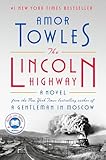 The Lincoln Highway by Amor Towles: It’s June 1954, and 18-year-old Emmett Watson has just finished serving 15 months at the juvenile work farm for involuntary manslaughter. But when he returns home to Nebraska expecting to pick up his kid brother Billy and leave for California to start a new life, he gets a surprise. Two buddies from the work farm are waiting to take him the other way—to New York City, where beguiling characters and adventures await. Told from multiple points of view, the novel is reason to rejoice for Towles’s millions of fans, who made his first two novels, Rules of Civility and A Gentleman in Moscow, runaway international bestsellers. (Bill)
The Lincoln Highway by Amor Towles: It’s June 1954, and 18-year-old Emmett Watson has just finished serving 15 months at the juvenile work farm for involuntary manslaughter. But when he returns home to Nebraska expecting to pick up his kid brother Billy and leave for California to start a new life, he gets a surprise. Two buddies from the work farm are waiting to take him the other way—to New York City, where beguiling characters and adventures await. Told from multiple points of view, the novel is reason to rejoice for Towles’s millions of fans, who made his first two novels, Rules of Civility and A Gentleman in Moscow, runaway international bestsellers. (Bill)
 Oh William! By Elizabeth Strout: William has remained close enough with his ex-wife Lucy that, after years of separation, she’s agreed to help him investigate a family secret. Together, they uncover past infidelity and hidden branches of his family tree. How well do any of us know one another; how can we share with others what we don’t know ourselves? (Nick M.)
Oh William! By Elizabeth Strout: William has remained close enough with his ex-wife Lucy that, after years of separation, she’s agreed to help him investigate a family secret. Together, they uncover past infidelity and hidden branches of his family tree. How well do any of us know one another; how can we share with others what we don’t know ourselves? (Nick M.)
 Monster in the Middle by Tiphanie Yanique: How do you determine who you’re meant to be with? How do you know if a relationship is meant to last? Award-winning novelist Yanique considers these questions in Monster in the Middle. Matthew Salesses declares, “Tiphanie Yanique is one of our very best writers. This book is another marvel.” The novel centralizes the relationship of Fly and Stela and their emotional inheritance, and it is set in the United States, Ghana, and Virgin Islands across decades. Natasha Trethewey calls the novel “a compelling exploration of how we become who we are and how we manage to find our way to love. In her lyrical prose, the myriad possibilities of being—the accidents of birth, of sex, of race and geography, the choices we make, our compulsions—coalesce into something that feels, gloriously, like destiny.” (Zoë)
Monster in the Middle by Tiphanie Yanique: How do you determine who you’re meant to be with? How do you know if a relationship is meant to last? Award-winning novelist Yanique considers these questions in Monster in the Middle. Matthew Salesses declares, “Tiphanie Yanique is one of our very best writers. This book is another marvel.” The novel centralizes the relationship of Fly and Stela and their emotional inheritance, and it is set in the United States, Ghana, and Virgin Islands across decades. Natasha Trethewey calls the novel “a compelling exploration of how we become who we are and how we manage to find our way to love. In her lyrical prose, the myriad possibilities of being—the accidents of birth, of sex, of race and geography, the choices we make, our compulsions—coalesce into something that feels, gloriously, like destiny.” (Zoë)
 The Every by Dave Eggers: Author, editor, and publisher Eggers has written a sequel to his bestselling novel The Circle, this time looking at the outsized power of tech monopolies. It’s about what happens when The Circle, the world’s largest social media company, merges with the most dominant e-commerce site to become The Every. The novel follows two employees of The Every who try to dismantle the company from the inside. In order to do some of his own dismantling, Eggers has MacGyvered a unique distribution strategy so that pub-date hardcover copies of his book will be exclusively available through independent booksellers; a paperback version will be rolled out six weeks later on a variety of e-commerce platforms (including Amazon). (Hannah)
The Every by Dave Eggers: Author, editor, and publisher Eggers has written a sequel to his bestselling novel The Circle, this time looking at the outsized power of tech monopolies. It’s about what happens when The Circle, the world’s largest social media company, merges with the most dominant e-commerce site to become The Every. The novel follows two employees of The Every who try to dismantle the company from the inside. In order to do some of his own dismantling, Eggers has MacGyvered a unique distribution strategy so that pub-date hardcover copies of his book will be exclusively available through independent booksellers; a paperback version will be rolled out six weeks later on a variety of e-commerce platforms (including Amazon). (Hannah)
 Silverview by John le Carré: Devotees of le Carré’s work will likely not be surprised that, despite his passing last December, he’s still producing novels. Billed as “an encounter between innocence and experience and between public duty and private morals,” this posthumous release gives another—final?—glimpse into the secrets we all wish could stay that way, delivered by the premier diagnostician of the predicament brought on by modernity. (Il’ja)
Silverview by John le Carré: Devotees of le Carré’s work will likely not be surprised that, despite his passing last December, he’s still producing novels. Billed as “an encounter between innocence and experience and between public duty and private morals,” this posthumous release gives another—final?—glimpse into the secrets we all wish could stay that way, delivered by the premier diagnostician of the predicament brought on by modernity. (Il’ja)
 The Jealousy Man by Jo Nesbø (translated by Robert Ferguson): So, when the “king of all crime writers” (Daily Express) has sold 45 million books in 50 languages, it’s probably time to put out a short story collection. And Nesbø has: 560 pages of chills inflicted by assortment of creeps, including a peeping tom, an assassin, a father out for post-apocalyptic vengeance, and a detective with a score to settle. Not for the faint of heart. (Il’ja)
The Jealousy Man by Jo Nesbø (translated by Robert Ferguson): So, when the “king of all crime writers” (Daily Express) has sold 45 million books in 50 languages, it’s probably time to put out a short story collection. And Nesbø has: 560 pages of chills inflicted by assortment of creeps, including a peeping tom, an assassin, a father out for post-apocalyptic vengeance, and a detective with a score to settle. Not for the faint of heart. (Il’ja)
 Pandemonium: A Visual History of Demonology by Ed Simon: Are you endlessly mixing up Asmodeus and Azazel? The Millions’ own Simon can help: he’s mapped out Satan’s family tree. When it comes to Western art and culture, the Devil certainly has been in the details for about five millennia now, and one could argue that his forte—conflict—is at the heart of any story worth reading. So, brush up your demonology with this singular, illustrated treatment that “celebrates the art of hell like never before.” (Il’ja)
Pandemonium: A Visual History of Demonology by Ed Simon: Are you endlessly mixing up Asmodeus and Azazel? The Millions’ own Simon can help: he’s mapped out Satan’s family tree. When it comes to Western art and culture, the Devil certainly has been in the details for about five millennia now, and one could argue that his forte—conflict—is at the heart of any story worth reading. So, brush up your demonology with this singular, illustrated treatment that “celebrates the art of hell like never before.” (Il’ja)
 Dreaming of You by Melissa Lozada-Oliva: This is a novel in verse, fitting for an acclaimed poet who has published three books of poetry. Dreaming of You follows a young Latinx poet who brings the pop star Selena back to life and embarks upon her own journey of hell, including a dead celebrity prom, in an exploration of celebrity, obsession, and identity. Terrance Hayes says of the book: “Melissa Lozada-Oliva’s kinetic, pop-operatic Dreaming of You is like some terrific amalgam of fan fiction and fantasy nonfiction; a Selena monograph made of memoir, myth and magic. Her partly satirical, partly ecstatic linguistics constitute a whole other sort of literary hybrid.” (Lydia)
Dreaming of You by Melissa Lozada-Oliva: This is a novel in verse, fitting for an acclaimed poet who has published three books of poetry. Dreaming of You follows a young Latinx poet who brings the pop star Selena back to life and embarks upon her own journey of hell, including a dead celebrity prom, in an exploration of celebrity, obsession, and identity. Terrance Hayes says of the book: “Melissa Lozada-Oliva’s kinetic, pop-operatic Dreaming of You is like some terrific amalgam of fan fiction and fantasy nonfiction; a Selena monograph made of memoir, myth and magic. Her partly satirical, partly ecstatic linguistics constitute a whole other sort of literary hybrid.” (Lydia)
 Between Certain Death and Possible Future, edited by Mattilda Bernstein Sycamore: The AIDS crisis and its trauma still looms large, a shadow over generations of queer people, but we often talk about those who came of age before and those who came later. Here, in a collection of 36 personal essays, the focus is on the generation in the middle—those who grew up during the epidemic and fully internalized its trauma early in their lives and as part of their identities. Between Certain Death and Possible Future contains stories of chosen families, lost communities, conventional wisdom rejected, and new wisdom shared; Dean Spade calls it “a must read for this moment.” (Kaulie)
Between Certain Death and Possible Future, edited by Mattilda Bernstein Sycamore: The AIDS crisis and its trauma still looms large, a shadow over generations of queer people, but we often talk about those who came of age before and those who came later. Here, in a collection of 36 personal essays, the focus is on the generation in the middle—those who grew up during the epidemic and fully internalized its trauma early in their lives and as part of their identities. Between Certain Death and Possible Future contains stories of chosen families, lost communities, conventional wisdom rejected, and new wisdom shared; Dean Spade calls it “a must read for this moment.” (Kaulie)
 One Friday in April: A Story of Suicide and Survival by Donald Antrim: Antrim, a brilliant novelist, short story writer, and memoirist, now explores suicide and names it as an illness in its own right in his new book, a work of memoir. The book begins with an account and excavation of a terrifying day in 2006 when Antrim found himself in crisis on the roof of a building, and recounts the years of struggle that followed as he fought for his life. A work of solace for the many people who have encountered this fear or lived with its aftermath. (Lydia)
One Friday in April: A Story of Suicide and Survival by Donald Antrim: Antrim, a brilliant novelist, short story writer, and memoirist, now explores suicide and names it as an illness in its own right in his new book, a work of memoir. The book begins with an account and excavation of a terrifying day in 2006 when Antrim found himself in crisis on the roof of a building, and recounts the years of struggle that followed as he fought for his life. A work of solace for the many people who have encountered this fear or lived with its aftermath. (Lydia)
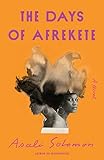 The Days of Afrekete by Asali Solomon: In this new novel from the author of Get Down and Disgruntled, two women who knew each other in college before embarking on very different paths come together in mid-life in a tender, comic, searching novel inspired by Mrs. Dalloway and Sula. Danielle Evans says of the novel, “Asali Solomon illuminates what it means to grow away from what felt like the truest version of yourself, what the way back might look like, what Black women in particular are asked to give up, and what it might mean to refuse. Solomon is a treasure: wise, hilarious, and full of poignant insight.” (Lydia)
The Days of Afrekete by Asali Solomon: In this new novel from the author of Get Down and Disgruntled, two women who knew each other in college before embarking on very different paths come together in mid-life in a tender, comic, searching novel inspired by Mrs. Dalloway and Sula. Danielle Evans says of the novel, “Asali Solomon illuminates what it means to grow away from what felt like the truest version of yourself, what the way back might look like, what Black women in particular are asked to give up, and what it might mean to refuse. Solomon is a treasure: wise, hilarious, and full of poignant insight.” (Lydia)
 Empty Wardrobes by Maria Judite de Carvalho (translated by Margaret Jull Costa): First published in Portugal in 1966, this novel is translated into English from the first time by Costa with an introduction by Kate Zambreno, who calls it “a compact, merciless tragedy.” In it, three generations of women live in thrall to the choices and thoughtlessness of men, and the central character mourns a husband who lived as a kind of messianic figure, until she learns a secret that throws all of his past acts into a new, awful light. (Lydia)
Empty Wardrobes by Maria Judite de Carvalho (translated by Margaret Jull Costa): First published in Portugal in 1966, this novel is translated into English from the first time by Costa with an introduction by Kate Zambreno, who calls it “a compact, merciless tragedy.” In it, three generations of women live in thrall to the choices and thoughtlessness of men, and the central character mourns a husband who lived as a kind of messianic figure, until she learns a secret that throws all of his past acts into a new, awful light. (Lydia)
 The Loneliest Americans by Jay Caspian Kang: New York Times Magazine writer-at-large, Vice News correspondent, and author of the novel The Dead Do Not Improve, interrogates identity and what it means to become, and to feel, “American.” (Marie)
The Loneliest Americans by Jay Caspian Kang: New York Times Magazine writer-at-large, Vice News correspondent, and author of the novel The Dead Do Not Improve, interrogates identity and what it means to become, and to feel, “American.” (Marie)
 When Two Feathers Fell from the Sky by Margaret Verble: A new novel from the Pulitzer Prize finalist for Maud’s Line takes place in the 1920s at Glendale Park Zoo, a now-defunct but once famous zoo in Nashville, where a daredevil horse-diver—a Cherokee woman—forges a friendship with a the scion of a Black landowning family and a zookeeper haunted by memories of World War I, while around them in segregated Nashville, apparitions and other frightening things swirl. (Lydia)
When Two Feathers Fell from the Sky by Margaret Verble: A new novel from the Pulitzer Prize finalist for Maud’s Line takes place in the 1920s at Glendale Park Zoo, a now-defunct but once famous zoo in Nashville, where a daredevil horse-diver—a Cherokee woman—forges a friendship with a the scion of a Black landowning family and a zookeeper haunted by memories of World War I, while around them in segregated Nashville, apparitions and other frightening things swirl. (Lydia)
 Search History by Eugene Lim: The author of the critically acclaimed 2017 novel Dear Cyborgs and The Strangers returns with a kaleidoscopic novel of art, grief, artificial intelligence, identity, and a man who is reincarnated as a dog. John Keene raves, “Lim has found a way to capture both the pointed specificity of the internet and its Borgesian infiniteness, in order to tell a picaresque tale about race and American culture, artificial intelligence, artmaking, storytelling, and so much more.” (Lydia)
Search History by Eugene Lim: The author of the critically acclaimed 2017 novel Dear Cyborgs and The Strangers returns with a kaleidoscopic novel of art, grief, artificial intelligence, identity, and a man who is reincarnated as a dog. John Keene raves, “Lim has found a way to capture both the pointed specificity of the internet and its Borgesian infiniteness, in order to tell a picaresque tale about race and American culture, artificial intelligence, artmaking, storytelling, and so much more.” (Lydia)
 Orwell’s Roses by Rebecca Solnit: Just when you think are you sick of hearing about George Orwell, Solnit, the author of more than 20 books, reveals a surprising side. Orwell was a passionate gardener, and especially enjoyed flowers. “If war has an opposite, gardens might sometimes be it,” the author writes, using this fresh insight to illuminate an absorbing mediation on Orwell’s work as a writer and antifascist. (Marie)
Orwell’s Roses by Rebecca Solnit: Just when you think are you sick of hearing about George Orwell, Solnit, the author of more than 20 books, reveals a surprising side. Orwell was a passionate gardener, and especially enjoyed flowers. “If war has an opposite, gardens might sometimes be it,” the author writes, using this fresh insight to illuminate an absorbing mediation on Orwell’s work as a writer and antifascist. (Marie)
 April in Spain by John Banville: The Booker Prize winner’s latest novel is a mystery set on the coast of the Basque Country in Spain. In San Sebastian, native Dubliner Quirke is struggling to relax and enjoy his time in the countryside, despite the pleasant locale and the amiable company of his wife. Then, one night, he spots a stranger in a bar who looks like April Latimer, the woman his brother murdered years before. He makes a call home to Ireland and summons Det. St. John Strafford, who flies down to Spain at the same time as a hit man, whose ultimate target may just be Quirke himself. (Thom)
April in Spain by John Banville: The Booker Prize winner’s latest novel is a mystery set on the coast of the Basque Country in Spain. In San Sebastian, native Dubliner Quirke is struggling to relax and enjoy his time in the countryside, despite the pleasant locale and the amiable company of his wife. Then, one night, he spots a stranger in a bar who looks like April Latimer, the woman his brother murdered years before. He makes a call home to Ireland and summons Det. St. John Strafford, who flies down to Spain at the same time as a hit man, whose ultimate target may just be Quirke himself. (Thom)
 A Time Outside This Time by Amitava Kumar: In the latest from the author of Immigrant, Montana, a professor and writer named Satya goes to a well-known artist’s retreat, where he finds the outside world increasingly difficult to ignore. A certain rage-filled president keeps tweeting, a virus is spreading across the globe, and seemingly every day brings another attention-grabbing news story. As time passes and the distractions don’t let up, Satya begins to synthesize these stories into a new novel, a contemporary story about the lies we tell ourselves and other people. (Thom)
A Time Outside This Time by Amitava Kumar: In the latest from the author of Immigrant, Montana, a professor and writer named Satya goes to a well-known artist’s retreat, where he finds the outside world increasingly difficult to ignore. A certain rage-filled president keeps tweeting, a virus is spreading across the globe, and seemingly every day brings another attention-grabbing news story. As time passes and the distractions don’t let up, Satya begins to synthesize these stories into a new novel, a contemporary story about the lies we tell ourselves and other people. (Thom)
 Spring and Autumn Annals by Diane DiPrima: A work of memoir and elegy by one of the great, under-recognized women Beats, a year after her death. Begun as letters to a friend, the dancer Freddie Herko, who died by suicide, the work is both a meditation on friendship and an account of a Brooklyn childhood that turned into a Village adulthood in the thick of a pivotal cultural moment. Chris Kraus says of the book: “Diane di Prima is one of the greatest writers of her generation, and this book offers a window into its lives.” (Lydia)
Spring and Autumn Annals by Diane DiPrima: A work of memoir and elegy by one of the great, under-recognized women Beats, a year after her death. Begun as letters to a friend, the dancer Freddie Herko, who died by suicide, the work is both a meditation on friendship and an account of a Brooklyn childhood that turned into a Village adulthood in the thick of a pivotal cultural moment. Chris Kraus says of the book: “Diane di Prima is one of the greatest writers of her generation, and this book offers a window into its lives.” (Lydia)
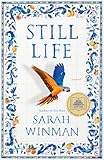 Still Life by Sarah Winman: Words you don’t expect to see in a publisher’s book description: “Big-hearted story of people brought together by the ghost of E.M. Forster.” Also file under: I want to read more, please. Still Life may not have actual ghosts, but Forster’s influence certainly shows in this, the fourth novel from Winman, author of When God was a Rabbit and Tin Man. A story of intergenerational friendship, love, and art, Still Life begins in 1944 in a Tuscan wine cellar, where a young soldier spends a life-changing evening talking to Evelyn, a much older art connoisseur (and accused spy) with memories of Forster and her own room with a view. (Kaulie)
Still Life by Sarah Winman: Words you don’t expect to see in a publisher’s book description: “Big-hearted story of people brought together by the ghost of E.M. Forster.” Also file under: I want to read more, please. Still Life may not have actual ghosts, but Forster’s influence certainly shows in this, the fourth novel from Winman, author of When God was a Rabbit and Tin Man. A story of intergenerational friendship, love, and art, Still Life begins in 1944 in a Tuscan wine cellar, where a young soldier spends a life-changing evening talking to Evelyn, a much older art connoisseur (and accused spy) with memories of Forster and her own room with a view. (Kaulie)
November
 The Sentence by Louise Erdrich:Pulitzer Prize and National Book Award winner Erdrich’s new book follows Tookie, a formerly incarcerated Ojibwe woman who takes a job in a Minneapolis bookstore after serving an absurdly long sentence. When one of the bookstore’s best customers dies, her ghost returns to the store to haunt Tookie. The ghost’s appearance leads Tookie and a fellow bookseller to a shocking personal discovery of historical consequence. Taking place over the course of a year, from All Soul’s Day 2019 to All Soul’s Day 2020, Erdrich confronts a year of pandemic and protest. (Hannah)
The Sentence by Louise Erdrich:Pulitzer Prize and National Book Award winner Erdrich’s new book follows Tookie, a formerly incarcerated Ojibwe woman who takes a job in a Minneapolis bookstore after serving an absurdly long sentence. When one of the bookstore’s best customers dies, her ghost returns to the store to haunt Tookie. The ghost’s appearance leads Tookie and a fellow bookseller to a shocking personal discovery of historical consequence. Taking place over the course of a year, from All Soul’s Day 2019 to All Soul’s Day 2020, Erdrich confronts a year of pandemic and protest. (Hannah)
 Look for Me and I’ll be Gone by John Edgar Wideman: For more than half a century, two-time PEN Award-winning novelist and short story author Wideman has very much been a writer’s writer. His magisterial The Homewood Trilogy made the Black neighborhood of his Pittsburgh youth as mythic as William Faulkner‘s Yoknapatawpha County, and if there were any literary justice in the United States, Wideman would be as widely known as the Nobel laureate. Arguably the last of the great modernist writers, Wideman combines stream of consciousness and the American vernacular in a style that recalls Joyce and Baldwin, and is yet entirely his own. His sixth collection of short stories, Look for Me and I’ll be Gone, gathering previously published material from The New Yorker, among other literary journals and magazines, returns to Wideman’s familiar themes of race and identity, punishment and injustice, Pittsburgh and Blackness. As Wideman said in an interview from Callaloo in 1989, “Good writing is always about things that are important to you, things that are scary to you, things that eat you up.” (Ed)
Look for Me and I’ll be Gone by John Edgar Wideman: For more than half a century, two-time PEN Award-winning novelist and short story author Wideman has very much been a writer’s writer. His magisterial The Homewood Trilogy made the Black neighborhood of his Pittsburgh youth as mythic as William Faulkner‘s Yoknapatawpha County, and if there were any literary justice in the United States, Wideman would be as widely known as the Nobel laureate. Arguably the last of the great modernist writers, Wideman combines stream of consciousness and the American vernacular in a style that recalls Joyce and Baldwin, and is yet entirely his own. His sixth collection of short stories, Look for Me and I’ll be Gone, gathering previously published material from The New Yorker, among other literary journals and magazines, returns to Wideman’s familiar themes of race and identity, punishment and injustice, Pittsburgh and Blackness. As Wideman said in an interview from Callaloo in 1989, “Good writing is always about things that are important to you, things that are scary to you, things that eat you up.” (Ed)
 Medusa’s Ankles by A.S. Byatt: Byatt demonstrated her long-form virtuosity in the wide ranging and beguiling Possession, and here shows her versatility in this collection of short stories. David Mitchell admires the range of these stories, both in theme and style, and Byatt’s “portraitist’s eye.” (Marie)
Medusa’s Ankles by A.S. Byatt: Byatt demonstrated her long-form virtuosity in the wide ranging and beguiling Possession, and here shows her versatility in this collection of short stories. David Mitchell admires the range of these stories, both in theme and style, and Byatt’s “portraitist’s eye.” (Marie)
 The Art of Revision: The Last Word by Peter Ho Davies: Davies, author of The Fortunes and A Lie Someone Told You About Yourself, has joined an illustrious line of writers, from Charles Baxter to Edwidge Danticat, in penning an “art of” book, my favorite craft books series, published by Graywolf Press. Davies sheds light on an often invisible part of writing—rewriting—by showing drafts of his own work as well as early drafts of Carmen Maria Machado and Flannery O’Connor, among others. He also uses the topic of revision to consider how it is not only the work that changes, but the writer, too. (Edan)
The Art of Revision: The Last Word by Peter Ho Davies: Davies, author of The Fortunes and A Lie Someone Told You About Yourself, has joined an illustrious line of writers, from Charles Baxter to Edwidge Danticat, in penning an “art of” book, my favorite craft books series, published by Graywolf Press. Davies sheds light on an often invisible part of writing—rewriting—by showing drafts of his own work as well as early drafts of Carmen Maria Machado and Flannery O’Connor, among others. He also uses the topic of revision to consider how it is not only the work that changes, but the writer, too. (Edan)
 The Perishing by Natashia Deón: Critically acclaimed writer Deón returns with The Perishing, a speculative and historical novel recommended for readers who love Octavia Butler and N. K. Jemisin. Deón’s second novel focuses on Lou, who finds herself in Los Angeles in the 1930s without any recollection of how she arrived, becomes the first Black journalist at The Los Angeles Times, and experiences flashbacks of various time periods. As Lou starts to believe she’s immortal and that she has arrived with an important and specific purpose, threats to her safety arise. Publishers Weekly and Library Journal have highlighted The Perishing as a fall must-read. (Zoë)
The Perishing by Natashia Deón: Critically acclaimed writer Deón returns with The Perishing, a speculative and historical novel recommended for readers who love Octavia Butler and N. K. Jemisin. Deón’s second novel focuses on Lou, who finds herself in Los Angeles in the 1930s without any recollection of how she arrived, becomes the first Black journalist at The Los Angeles Times, and experiences flashbacks of various time periods. As Lou starts to believe she’s immortal and that she has arrived with an important and specific purpose, threats to her safety arise. Publishers Weekly and Library Journal have highlighted The Perishing as a fall must-read. (Zoë)
 Win Me Something by Kyle Lucia Wu: As a biracial Chinese-American woman, Willa Chen has drifted through high school and college, struggling to come to some kind of peace with herself. But when she begins working as a nanny for the Adriens, a wealthy white New York City family, she is confronted with all of the things she never had. After moving in with the Adriens, Willa must come to terms with her complicated childhood and finally begin to define her adult life. As Crystal Hana Kim, author of If You Leave Me says: “Win Me Something is an observant, contemplative story about the complex reality of growing up with a mixed identity in two starkly different mixed families. Kyle Lucia Wu deftly weaves back and forth between Willa’s teenaged years and her adult life to explore loneliness, uncertainty, and a singular, persistent question―where do I truly belong?” (Adam Price)
Win Me Something by Kyle Lucia Wu: As a biracial Chinese-American woman, Willa Chen has drifted through high school and college, struggling to come to some kind of peace with herself. But when she begins working as a nanny for the Adriens, a wealthy white New York City family, she is confronted with all of the things she never had. After moving in with the Adriens, Willa must come to terms with her complicated childhood and finally begin to define her adult life. As Crystal Hana Kim, author of If You Leave Me says: “Win Me Something is an observant, contemplative story about the complex reality of growing up with a mixed identity in two starkly different mixed families. Kyle Lucia Wu deftly weaves back and forth between Willa’s teenaged years and her adult life to explore loneliness, uncertainty, and a singular, persistent question―where do I truly belong?” (Adam Price)
 White on White by Ayşegül Savaş: “Beauty avoids our grasp because it’s made of the same, ephemeral texture as imagination,” the Paris-based Turkish writer Savaş writes in her essay, “On Invisible Beauty,” published in our very own pages. Beauty and art are subjects Savaş returns to in her second novel, White on White. When, by virtue of proximity, a student of Gothic nudes becomes a companion and repository of stories told by her artist landlord, she becomes a student not only of art but of life. Lauren Groff compares White on White’s elegance to “an opaque sheet of ice that belies the swift and turbulent waters beneath. (Anne K. Yoder)
White on White by Ayşegül Savaş: “Beauty avoids our grasp because it’s made of the same, ephemeral texture as imagination,” the Paris-based Turkish writer Savaş writes in her essay, “On Invisible Beauty,” published in our very own pages. Beauty and art are subjects Savaş returns to in her second novel, White on White. When, by virtue of proximity, a student of Gothic nudes becomes a companion and repository of stories told by her artist landlord, she becomes a student not only of art but of life. Lauren Groff compares White on White’s elegance to “an opaque sheet of ice that belies the swift and turbulent waters beneath. (Anne K. Yoder)
 New York, My Village by Uwem Akpan: In Akpan’s debut novel (following Say You’re One of Them, his bestselling, critically-acclaimed collection), Nigerian editor Ekong Udousoro, who is working on a collection about the Biafran War, relocates to New York City after receiving a publishing fellowship—only to discover the dark side of an industry that smiles in his face while disparaging his home, race, and culture. Elif Batuman writes: “Unforgettable characters, deeply realistic and ‘relatable’ interpersonal conflicts, a contagious love of life, fresh insights into the crazy-making properties of racist ideology: New York, My Village has it all.” (Carolyn)
New York, My Village by Uwem Akpan: In Akpan’s debut novel (following Say You’re One of Them, his bestselling, critically-acclaimed collection), Nigerian editor Ekong Udousoro, who is working on a collection about the Biafran War, relocates to New York City after receiving a publishing fellowship—only to discover the dark side of an industry that smiles in his face while disparaging his home, race, and culture. Elif Batuman writes: “Unforgettable characters, deeply realistic and ‘relatable’ interpersonal conflicts, a contagious love of life, fresh insights into the crazy-making properties of racist ideology: New York, My Village has it all.” (Carolyn)
 Sacred City by Theodore C. Van Alst: A follow-up to Van Alst’s debut, Sacred Smokes, the story tracks a young man guided by an ancestral band only he (and the reader) can see, leading us on a path toward the inevitable conclusion that “Chicago was, is, and always will be Indian Country.” (Il’ja)
Sacred City by Theodore C. Van Alst: A follow-up to Van Alst’s debut, Sacred Smokes, the story tracks a young man guided by an ancestral band only he (and the reader) can see, leading us on a path toward the inevitable conclusion that “Chicago was, is, and always will be Indian Country.” (Il’ja)
 Chasing Homer by László Krasznahorkai (translated by John Batki, musical performances by Szilveszter Miklós, illustrated by Max Neumann): Brief (only 96 pages), collaborative, and propulsive—Chasing Homer is a chase story the likes of which you’ve not yet experienced in a book. The story: a being with no past, for whom only the present moment exists, blends into every terrain in a desperate attempt to elude the hunt and outrun death. It’ll be weird but it’ll be good. (Il’ja)
Chasing Homer by László Krasznahorkai (translated by John Batki, musical performances by Szilveszter Miklós, illustrated by Max Neumann): Brief (only 96 pages), collaborative, and propulsive—Chasing Homer is a chase story the likes of which you’ve not yet experienced in a book. The story: a being with no past, for whom only the present moment exists, blends into every terrain in a desperate attempt to elude the hunt and outrun death. It’ll be weird but it’ll be good. (Il’ja)
 The Four Humors by Mina Seçkin: As someone whose vade mecum is Robert Burton’s The Anatomy of Melancholy, I’m especially excited for Seçkin’s debut novel, in which a young woman analyzes her illness according to the four humors theory. (My problem: excess of phlegm.) Taking place over a summer in Istanbul, where the woman has travelled to care for her ailing grandmother, the novel balances the protagonist’s humor-gazing with stories of her family’s and Turkey’s history. The premise faintly echoes two other recent medico-literary works of quackery and experimental treatment: Ottessa Moshfegh’s My Year of Rest and Relaxation and Deborah Levy’s Hot Milk. (Matt)
The Four Humors by Mina Seçkin: As someone whose vade mecum is Robert Burton’s The Anatomy of Melancholy, I’m especially excited for Seçkin’s debut novel, in which a young woman analyzes her illness according to the four humors theory. (My problem: excess of phlegm.) Taking place over a summer in Istanbul, where the woman has travelled to care for her ailing grandmother, the novel balances the protagonist’s humor-gazing with stories of her family’s and Turkey’s history. The premise faintly echoes two other recent medico-literary works of quackery and experimental treatment: Ottessa Moshfegh’s My Year of Rest and Relaxation and Deborah Levy’s Hot Milk. (Matt)
 The Making of Incarnation by Tom McCarthy: A novel that explores the varied “intersection(s) of technology and the human” and the limits, or lack thereof, of imagination. McCarthy stirs together the art of raising 12 children, counting sheep, and the laws of motion to paint a compelling portrait of the drives that inhabit and inhibit us. A wild ride. (Il’ja)
The Making of Incarnation by Tom McCarthy: A novel that explores the varied “intersection(s) of technology and the human” and the limits, or lack thereof, of imagination. McCarthy stirs together the art of raising 12 children, counting sheep, and the laws of motion to paint a compelling portrait of the drives that inhabit and inhibit us. A wild ride. (Il’ja)
 Taste Makers: Seven Immigrant Women who Revolutionized Food in America by Mayukh Sen: Nowadays many people write or produce videos about food and culture, but Mayukh Sen is arguably the first one who makes you feel the American kitchen sizzling with wonder. Taste Makers carefully selects seven extraordinarily courageous, brilliant, and loving immigrant women who dedicate their lives to what Americans take for granted in their diet today. James Beard Award-winning writer Sen’s impeccable research accurately restores the lives of these women; his lively prose style matches the vivacity of his heroines. More importantly, he both entertains and challenges our previous mental association of women and food. After reading this group biography, perhaps what we see on our mundane plate is no longer the same as before. (Jianan)
Taste Makers: Seven Immigrant Women who Revolutionized Food in America by Mayukh Sen: Nowadays many people write or produce videos about food and culture, but Mayukh Sen is arguably the first one who makes you feel the American kitchen sizzling with wonder. Taste Makers carefully selects seven extraordinarily courageous, brilliant, and loving immigrant women who dedicate their lives to what Americans take for granted in their diet today. James Beard Award-winning writer Sen’s impeccable research accurately restores the lives of these women; his lively prose style matches the vivacity of his heroines. More importantly, he both entertains and challenges our previous mental association of women and food. After reading this group biography, perhaps what we see on our mundane plate is no longer the same as before. (Jianan)
 Love in the Big City by Sang Young Park: Contradictions abound in Sang Young Park’s English-language debut, and that’s exactly how it should be. The Seoul inhabited by the book’s hero, Young, is filled with joy, sadness, anxiety, heartbreak, languor, and intensity—sometimes all in one chapter. As Young grows, yearns, and makes messy mistakes, readers will find themselves rooting for him all the way until the brilliant end. (Kate)
Love in the Big City by Sang Young Park: Contradictions abound in Sang Young Park’s English-language debut, and that’s exactly how it should be. The Seoul inhabited by the book’s hero, Young, is filled with joy, sadness, anxiety, heartbreak, languor, and intensity—sometimes all in one chapter. As Young grows, yearns, and makes messy mistakes, readers will find themselves rooting for him all the way until the brilliant end. (Kate)
 Noor by Nnedi Okorafor: Widely known—and loved, and awarded—for her genre-bending, Africanfuturist novels and stories (see: Who Fears Death, Lagoon), Okorafor is back with a vivid and unpredictable rush of a new novel. Anwuli Okwudili—or AO, for Artificial Organism—is a woman who relies on her many body augmentations to live. But when someone gets hurt, she’s forced to go on the run, heading into and across the deserts of Northern Nigeria with a Fulani herdsman, DNA, alongside her and the world watching the “saga of the wicked woman and the mad man” unfold in real time. (Kaulie)
Noor by Nnedi Okorafor: Widely known—and loved, and awarded—for her genre-bending, Africanfuturist novels and stories (see: Who Fears Death, Lagoon), Okorafor is back with a vivid and unpredictable rush of a new novel. Anwuli Okwudili—or AO, for Artificial Organism—is a woman who relies on her many body augmentations to live. But when someone gets hurt, she’s forced to go on the run, heading into and across the deserts of Northern Nigeria with a Fulani herdsman, DNA, alongside her and the world watching the “saga of the wicked woman and the mad man” unfold in real time. (Kaulie)
 These Precious Days by Ann Patchett: A new collection of personal essays from the beloved Patchett, including a meditation on a surprising and beautiful bond formed with Tom Hanks’s assistant, a woman named Sooki, which is basically indescribable outside of the essay that describes it, but which you can read here at Harper’s. (Lydia)
These Precious Days by Ann Patchett: A new collection of personal essays from the beloved Patchett, including a meditation on a surprising and beautiful bond formed with Tom Hanks’s assistant, a woman named Sooki, which is basically indescribable outside of the essay that describes it, but which you can read here at Harper’s. (Lydia)
 Blue-Skinned Gods by SJ Sindu: Roxane Gay writes that Blue-Skinned Gods, the second novel from Sindu, is “consummate storytelling,” “heart breaking and exhilarating”; others have called it stunning, profound, a marvel. In Tamil Nadu, India, a young boy named Kalki is born with impossibly blue skin. He is believed to be—and is worshipped as—Vishnu reincarnated, but he begins to have his doubts. As his relationships with his community and family begin to crumble, Kalki lands in New York City, seeking refuge in the city’s underground rock scene as he works to discover exactly who—and what—he is. (Kaulie)
Blue-Skinned Gods by SJ Sindu: Roxane Gay writes that Blue-Skinned Gods, the second novel from Sindu, is “consummate storytelling,” “heart breaking and exhilarating”; others have called it stunning, profound, a marvel. In Tamil Nadu, India, a young boy named Kalki is born with impossibly blue skin. He is believed to be—and is worshipped as—Vishnu reincarnated, but he begins to have his doubts. As his relationships with his community and family begin to crumble, Kalki lands in New York City, seeking refuge in the city’s underground rock scene as he works to discover exactly who—and what—he is. (Kaulie)
 God of Mercy by Okezie Nwọka: A debut novel set in an Igbo village where the forces of colonialism have not found root now finds itself at odds with its neighboring colonized villages, with dire consequences for its heroine Iljeoma, a girl who can fly. Maisy Card calls the novel “a profound exploration of religion, faith, and compassion from a gifted storyteller. Okezie Nwọka creates a richly imagined postcolonial landscape that is at once otherworldly, tragically human, and completely unforgettable.” (Lydia)
God of Mercy by Okezie Nwọka: A debut novel set in an Igbo village where the forces of colonialism have not found root now finds itself at odds with its neighboring colonized villages, with dire consequences for its heroine Iljeoma, a girl who can fly. Maisy Card calls the novel “a profound exploration of religion, faith, and compassion from a gifted storyteller. Okezie Nwọka creates a richly imagined postcolonial landscape that is at once otherworldly, tragically human, and completely unforgettable.” (Lydia)
 Five Tuesdays in Winter by Lily King: King follows five critically acclaimed novels, most recently Euphoria and Writers and Lovers, with her first collection of short stories. Ann Patchett raved that the new offering “moved me, inspired me, thrilled me. It filled up ever chamber of my heart. I loved this book.” (Lydia)
Five Tuesdays in Winter by Lily King: King follows five critically acclaimed novels, most recently Euphoria and Writers and Lovers, with her first collection of short stories. Ann Patchett raved that the new offering “moved me, inspired me, thrilled me. It filled up ever chamber of my heart. I loved this book.” (Lydia)
 Pity the Beast by Robin McLean: Following her debut collection Reptile House, this novel of the western U.S. jumps back and forth in time from prehistory to far in the future, focusing its eye on the time in between, during which a woman named Ginny has just cheated on her husband. A new feminist western about which J.M. Coetzee raved, “Not since Faulkner have I read American prose so bristling with life and particularity.” (Lydia)
Pity the Beast by Robin McLean: Following her debut collection Reptile House, this novel of the western U.S. jumps back and forth in time from prehistory to far in the future, focusing its eye on the time in between, during which a woman named Ginny has just cheated on her husband. A new feminist western about which J.M. Coetzee raved, “Not since Faulkner have I read American prose so bristling with life and particularity.” (Lydia)
 Our Country Friends by Gary Shteyngart: In what may be the season’s first explicitly Covid-19 novel, funny-sad author Shteyngart chronicles eight friends, including a Russian-born novelist and his wife, their child obsessed with K-pop, a Korean American app developer, and various other artistes isolated upstate in March of 2020 for a Boccaccian idyll in which they are safe from a deadly virus but not from themselves, their hungers, and their pasts. Looking forward to the hyper-observant author’s take in what Salman Rushdie pegs it as “A powerful fable of our broken time.” (Marie)
Our Country Friends by Gary Shteyngart: In what may be the season’s first explicitly Covid-19 novel, funny-sad author Shteyngart chronicles eight friends, including a Russian-born novelist and his wife, their child obsessed with K-pop, a Korean American app developer, and various other artistes isolated upstate in March of 2020 for a Boccaccian idyll in which they are safe from a deadly virus but not from themselves, their hungers, and their pasts. Looking forward to the hyper-observant author’s take in what Salman Rushdie pegs it as “A powerful fable of our broken time.” (Marie)
 Island of Missing Trees by Elif Shafak: On Cyprus, a Greek Christian boy and a Turkish Muslim girl share a secret courtship. One day, war changes everything. Years later, curious about her family history, a London girl returns to the island where her parents met, where she’s never been. What does she find? (Nick M.)
Island of Missing Trees by Elif Shafak: On Cyprus, a Greek Christian boy and a Turkish Muslim girl share a secret courtship. One day, war changes everything. Years later, curious about her family history, a London girl returns to the island where her parents met, where she’s never been. What does she find? (Nick M.)
December
 I’m Not Hungry but I Could Eat by Christopher Gonzalez: As the title implies, all the protagonists in this story collection struggle with midnight cravings to some extent. A college graduate attends the bachelor party of a high school crush and has the confusing desire rekindled; a cat-sitter accidentally troubles his friend with the excessive grease of French fries and his undue longing for connection. Though those crucial, intimate moments of self-discovery, the physical sense of hunger gains a metaphorical weight as the constant human yearning for where we can call a home. (Jianan)
I’m Not Hungry but I Could Eat by Christopher Gonzalez: As the title implies, all the protagonists in this story collection struggle with midnight cravings to some extent. A college graduate attends the bachelor party of a high school crush and has the confusing desire rekindled; a cat-sitter accidentally troubles his friend with the excessive grease of French fries and his undue longing for connection. Though those crucial, intimate moments of self-discovery, the physical sense of hunger gains a metaphorical weight as the constant human yearning for where we can call a home. (Jianan)
 Tell Me How to Be by Neel Patel: Patel follows up his collection If You See Me, Don’t Say Hi with a novel of mother-son and other forms of love and rediscovery set against the backdrop of ’90s R&B. Akash leaves Los Angeles for Illinois, where his widowed mother, Renu, is selling the family home. As they pack up, both confront the errors and regrets of the past. Susie Yang says of the novel ,“Once in a while there comes a book that reminds us of why we read: to feel, to question, to grow…The emotional truth of this indelibly portrayed family and their messy lives will leave you weeping and shattered.” (Lydia)
Tell Me How to Be by Neel Patel: Patel follows up his collection If You See Me, Don’t Say Hi with a novel of mother-son and other forms of love and rediscovery set against the backdrop of ’90s R&B. Akash leaves Los Angeles for Illinois, where his widowed mother, Renu, is selling the family home. As they pack up, both confront the errors and regrets of the past. Susie Yang says of the novel ,“Once in a while there comes a book that reminds us of why we read: to feel, to question, to grow…The emotional truth of this indelibly portrayed family and their messy lives will leave you weeping and shattered.” (Lydia)
 The Women I Love by Francesco Pacifico (translated by Elizabeth Harris): Pacifico composed a series of idiosyncratic lockdown dispatches from Rome for n+1 in which he mused on his father’s hip replacement and wrote a tongue-in-cheek breakup letter to his writing career. Not so fast, as he has an exuberant new work out in English. Pacifico’s previous novel to be translated, Class, was a bright-young-things tale about Italian ex-pats in New York City. His latest, The Women I Love, is set in Italy and features a middle-aged writer anatomizing the women—lovers, colleagues, relatives—who enrich and complicate his life. (Matt)
The Women I Love by Francesco Pacifico (translated by Elizabeth Harris): Pacifico composed a series of idiosyncratic lockdown dispatches from Rome for n+1 in which he mused on his father’s hip replacement and wrote a tongue-in-cheek breakup letter to his writing career. Not so fast, as he has an exuberant new work out in English. Pacifico’s previous novel to be translated, Class, was a bright-young-things tale about Italian ex-pats in New York City. His latest, The Women I Love, is set in Italy and features a middle-aged writer anatomizing the women—lovers, colleagues, relatives—who enrich and complicate his life. (Matt)
